

Cutting-Edge AI Travel Agents That Make Planning Trips Easy
Dreaming of your next trip to a beachside oasis, urban city center, or off-the-path adventure in a new country? You’re probably thinking about booking flights, choosing accommodations, and figuring out the best places to dine and explore while you’re at your destination.
Picture this: What if you could talk to an expert who knows all the upcoming flights, the best hotels, and how much they cost? And what if that expert knew the best places to visit based on your preferences?
This expert exists. In fact, you can talk to them day or night because they never sleep. I’m talking, of course, about the AI travel agent.
What’s an AI Travel Agent?
AI travel agents perform the function of a traditional travel agent using the power of computers and artificial intelligence. These programs can look at large amounts of data and make calculations or use natural language processing to give you travel recommendations in the course of a conversation.
These AI-powered travel agents can take many forms, including:
Why Use an AI-Powered Travel Assistant?
There are so many reasons why you should consider looking at an AI tool for your next trip, including:
What Is the Best AI Travel Agent?
Here’s the AI travel agents available so far:
Best Overall Assistant

You’ve probably heard of ChatGPT already. When it hit the internet on November 30, 2022, it was covered by nearly every news organization, blogger, and social media influencer and grew to 1 million users in less than a week—that’s how much this software has revolutionized the internet.
ChatGPT can handle almost anything you ask, which means it can also help you plan out your next trip.
Here’s how it handled a few of my requests:
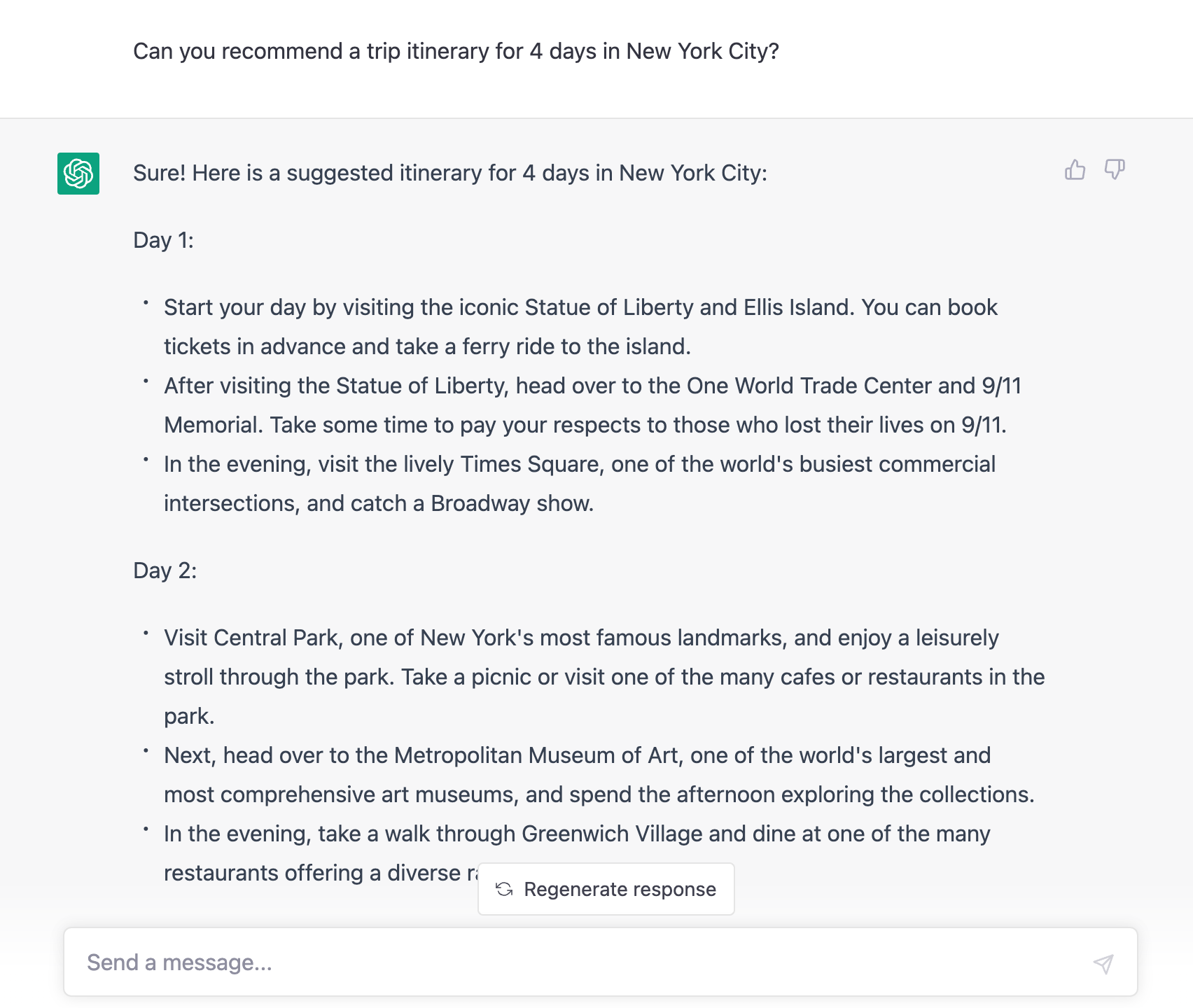
The downside is that ChatGPT has a closed dataset from 2020 or 2021 and can’t pull in any new data . It won’t help you find flight information, but it can draw on its knowledge of the internet to give you recommendations for travel.
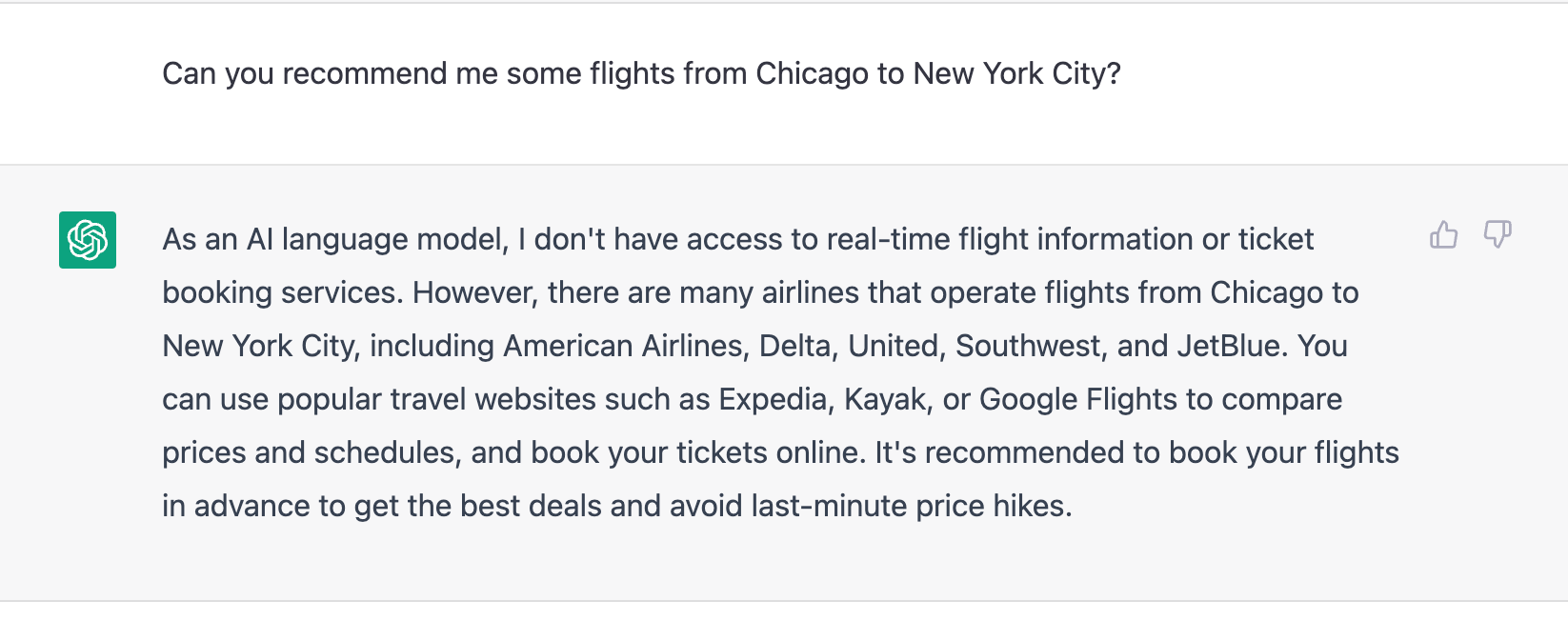
ChatGPT Pricing
ChatGPT is free to use, but the server sometimes goes down because of too much activity. You can get priority access and connect ChatGPT to the latest language model, GPT-4, on the Pro plan for $20 a month.
ChatGPT Verdict
If it’s your first time trying out AI-powered travel software, give ChatGPT a try. It might be all you need for your upcoming trip and inspire some great ideas.
2. GuideGeek
Most Conversational

GuideGeek is a WhatsApp-based travel chatbot that can give you travel recommendations, flight recommendations, information about the language or culture where you’re visiting, and generally answer any travel-related questions you have.
I tested it out and found it to be really helpful.
Here are some snapshots of my conversation with the bot:
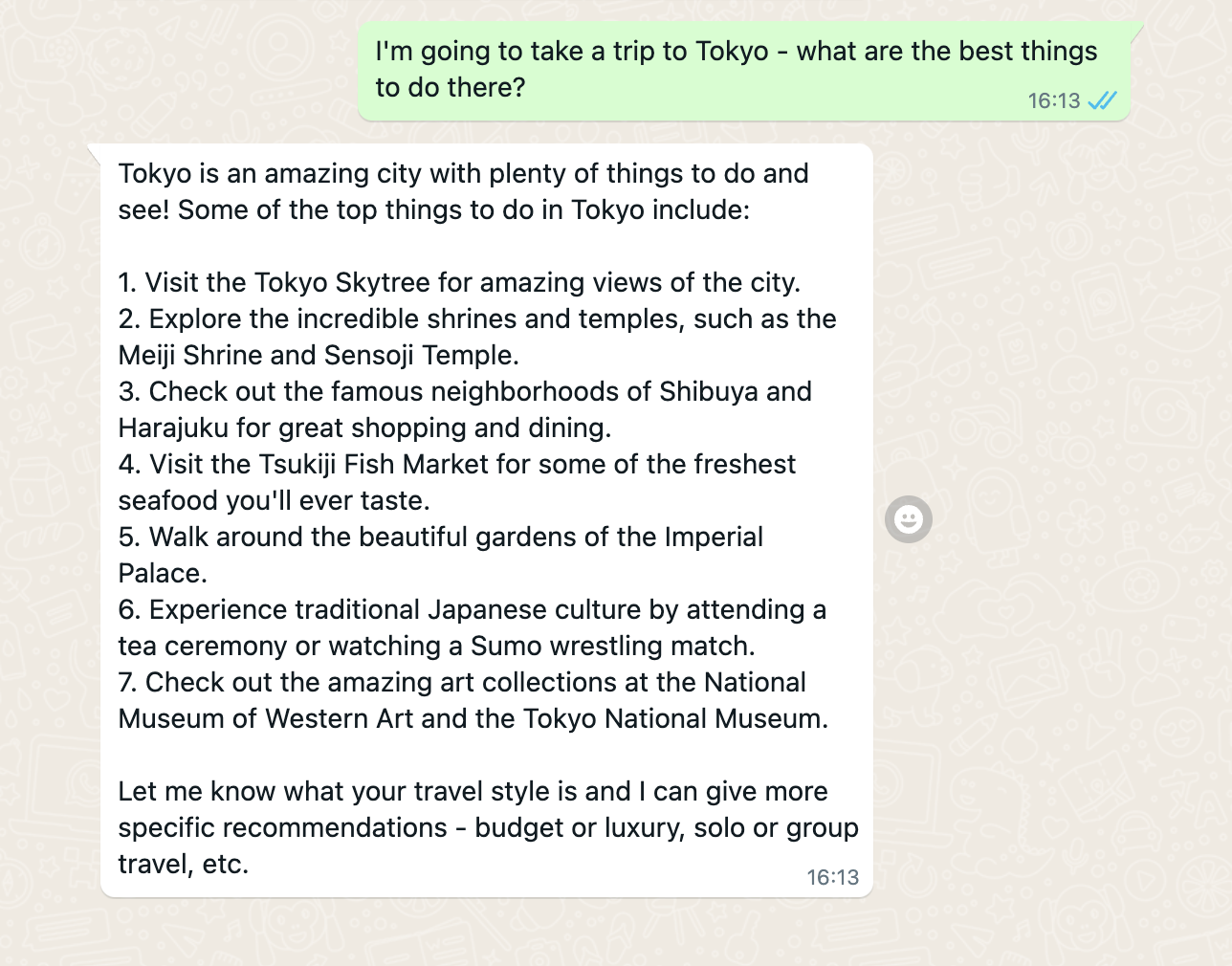
The con with this is that it can’t provide specific flight recommendations or do price forecasting. It only gave some vague recommendations of flights based on the dates and places I said I would travel, but I would need to go to the travel companies directly to book the flights.
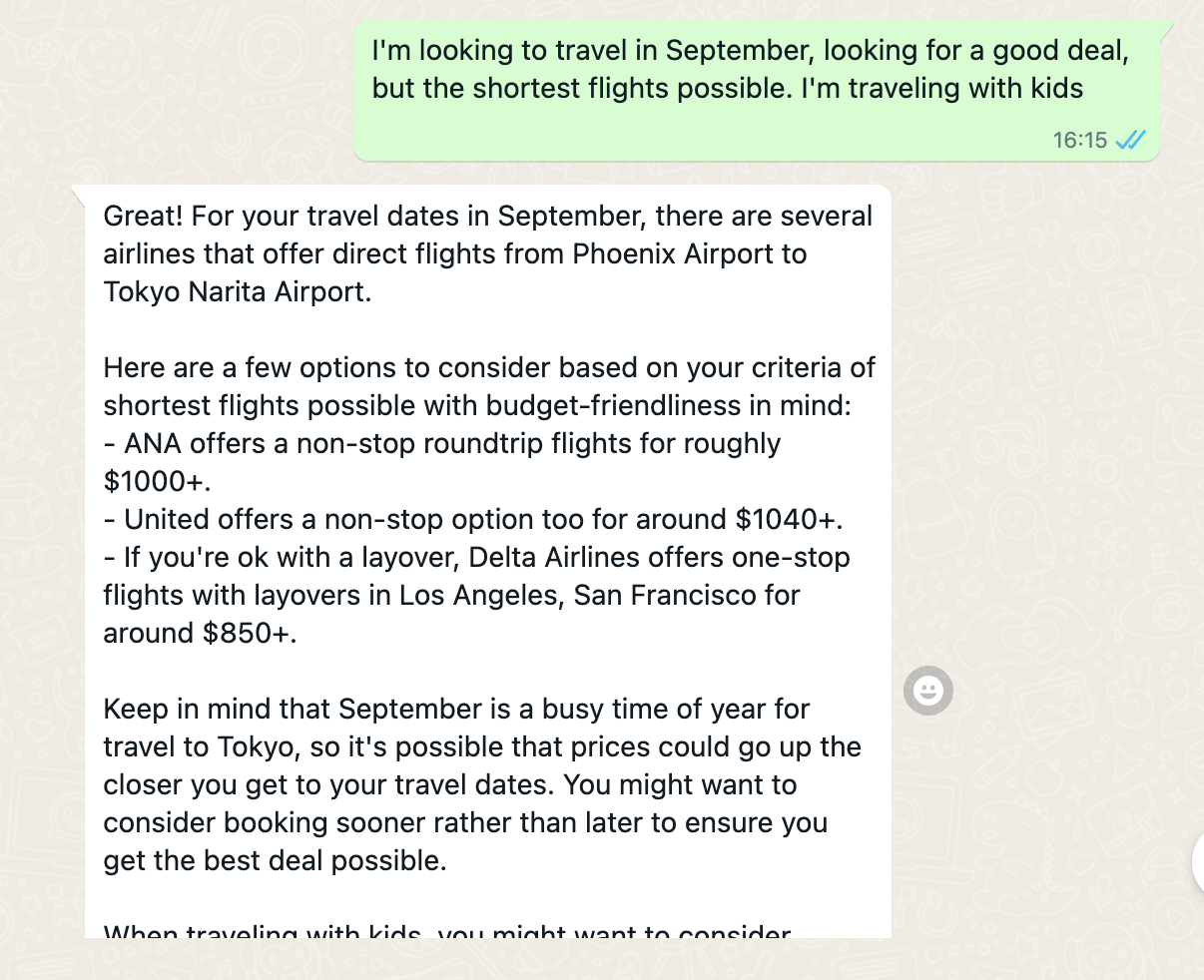
You can, however, find hotels and Airbnb listings, and the bot asks you for your preferences to help you find the best option for your search.
One question I have is the security of the answers. There’s no security policy on the website, so it’s best to refrain from providing personal information in your conversations with the bot.
Guide Geek Pricing
GuideGeek is free to use.
Guide Geek Final Verdict
GuideGeek gives you a fun and interactive way to plan your trip. It really does feel like you’re chatting with a knowledgeable and friendly travel agent and getting answers to all your burning questions.
3. EddyTravels
Quick Deals

EddyTravels is an AI-based flight and hotel booking app with an interactive AI assistant called Eddy AI. In a few clicks, you can get custom-tailored flight, hotel, and tour recommendations based on your needs.
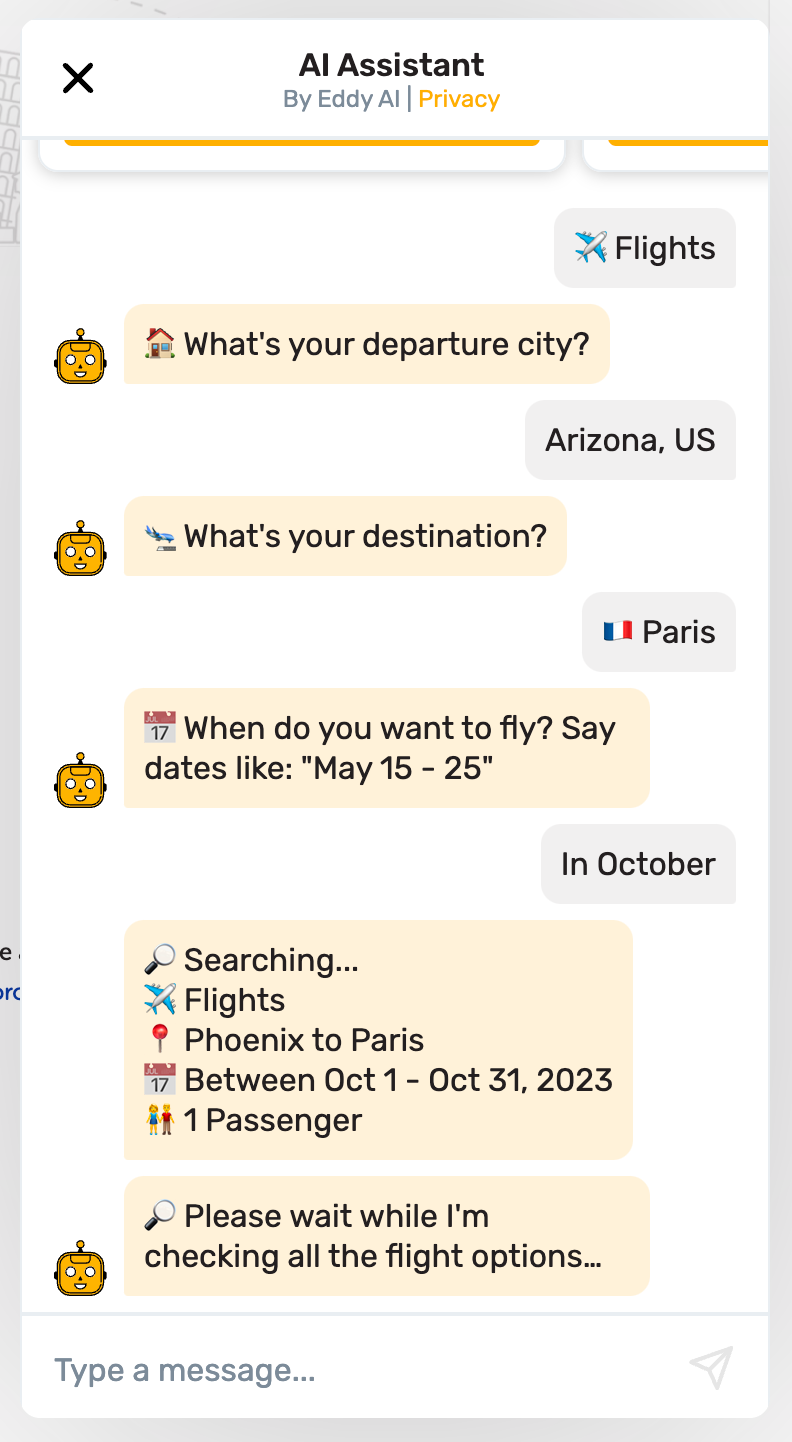
After getting some initial recommendations, you can change your dates or ask for more info. Click directly on the deal you like to move to a purchase page. Plus, the chatbot supports multiple languages.
The downside of this chatbot is that you can only search for packages to buy, and there isn’t much conversation to be had (unlike GuideGeek). Also, the bot couldn’t understand every query; for example, I told it I wanted flights with fewer stops, and it didn’t understand what I was asking.
Eddy Pricing
Eddy AI is free to use.
Eddy Final Verdict
If you’re looking for flights, hotels, and tours and want to get recommendations fast with the help of AI, EddyTravel is for you.
Predict Price Changes

Hopper is an AI-powered price forecasting and travel booking app that can predict price changes with up to 95% accuracy. This means that you can wait until your flights or hotel rooms are at the lowest possible price before booking. It also has a Price Freeze feature that lets you save a low price if you need a little more time to decide.
The con of using Hopper is that it’s only available as a mobile app.
Hopper Pricing
You can download and use Hopper for free on iOS and Android.
Hopper Final Verdict
If you’re ready to book a flight or hotel and want to get the absolute best price, you should definitely try Hopper.
How Will AI Change The Travel Industry?
AI is set to change the travel industry as we know it. Here are a few ways I predict it will change things:
Frequently Asked Questions (FAQs)
What is artificial intelligence.
A computer program has artificial intelligence when it can learn and use information much like a human would, using technology like machine learning and natural language processing.
How do AI travel agents treat customer data?
This is one of the sticky subjects of AI chatbots. Your best bet is to look through the fine print and privacy policies of each AI service you use. It will vary.
Why do travel companies use AI-powered travel agents?
AI-powered travel agents save travel companies a lot of money, as they can hire fewer personnel and direct more traffic toward an AI chatbot. AI can also help predict demand and help the company make better data-driven decisions to increase bookings and revenue.
Online Entrepreneur
I'm on a mission to help small businesses implement the best AI and digital solutions on the market. Digital transformation can be complex and overwhelming, let me help you streamline your approach with my in-depth reviews and experiences.
Similar Posts

Teal HQ Review: Will It Help You Land The Job?

21+ Best AI Lead Generation Software to Win More Leads

6 Best AI Music Generators: March To Your Own Beat

11 Best AI Content Platforms to Help You Rank in 2023

The Best AI Photo Editors For The Busy Photographer

12 Best AI Recruiting Software to Find Exceptional Talent (2023)
What AI means for travel—now and in the future
“Revenge travel.” It’s what a lot of people are doing these days—hitting the runways in big numbers to make up for travel time lost during the pandemic. On this episode of The McKinsey Podcast , McKinsey partners Alex Cosmas and Vik Krishnan join global editorial director Lucia Rahilly to discuss a new report on travel in the age of AI : what the technology’s promise and pitfalls are and what it may mean for the travel industry overall.
This transcript has been edited for clarity and length.
The McKinsey Podcast is cohosted by Roberta Fusaro and Lucia Rahilly.
The promise of AI
Lucia Rahilly: Much of the research for the report drew from interviews with executives at 17 companies across five types of travel businesses. One of those executives is Luca Zambello, CEO of Jurny—an AI-fueled hospitality platform. He says AI will be the new normal.
Luca Zambello: We’re at the very beginning of the hockey stick. Economically, we are at the start of what is potentially the biggest technology disruption that humanity has ever seen.
Lucia Rahilly: So everyone is talking about the disruptive juggernaut that is AI, and particularly gen AI [generative AI]. At a super-high level, and acknowledging that we’re still in early days, what do we expect this to mean for the travel industry in particular?
Vik Krishnan: The travel industry is unquestionably going to be significantly disrupted by AI. Whether it’s gen AI or other forms of AI that have been around for some time remains to be seen. It’s quite clear that if you work through the customer journey and the process of trying to understand where you want to go, where you want to stay, what are the things you want to see, how you want to plan your day-by-day itinerary, gen AI significantly eases the process of travel discovery.
If you then step into what this means for travel suppliers, which includes airlines and hotels and cruises and car rentals and rideshare providers, the promise of AI is very much to help them deliver on the promises, both explicit and implicit, that they make to their customers.
Gen AI significantly eases the process of travel discovery.
What I mean by that is, very often, the expectations of travel are that your flight is on time, your bags get delivered to you safely, you then get to your hotel, your hotel room is available to check into when you get there, and you have a room that provides exactly what you asked for. That baseline expectation is one that many travel companies have historically struggled to meet.
What AI can do is help airlines ensure that planes are on time. It can help hotels ensure that what they deliver in terms of staffing and the product promise is consistent with what they advertise in their marketing and branding strategies.
Alex Cosmas: Not only is travel and hospitality the world’s largest sector, but it’s actually the most intimate sector. That means the answer for each of us to what a good experience looks like—whether I’m traveling for leisure or for business—is, by definition, fundamentally different. And the promise of AI has been to take the pattern of history, take the pattern of millions, and boil that down to the individual response that is relevant to me as a segment of one.
Nowhere is that promise needed more than in travel, where the experience should be a segment of one. That’s what makes it magical. To be clear, AI is already being applied in the travel sector in spades—specifically, in the operation of schedule assets and the optimized allocation of rooms and crews. That’s been true for decades, and it’s only getting better.
But the customer-facing applications of AI are only now really becoming next-generation. And for the most part, in travel, the best AI applications will largely be opaque to customers, because they’ll still be delivered through the mediums that customers prefer: often through humans, through the front line, through desk agents, through guest agents.
AI is already being applied in the travel sector in spades—specifically, in the operation of schedule assets and the optimized allocation of rooms and crews.
That’s ideally the promise. But the starting point is to say we can’t suddenly expect that customers will prefer to interact through more digital channels than they have in the past. Travel is a very human-centric business. And so the best AI, the best models, will be delivered through traditional channels.
How AI can change travel—for the better
Lucia Rahilly: What kind of value might come from using gen AI in the travel industry?
Alex Cosmas: Our latest estimates suggest that gen AI alone, across sectors, is bound to unlock $2 trillion to $4 trillion of incremental value.
Lucia Rahilly: Wow.
Alex Cosmas: Therefore, not surprisingly, capital is chasing the disruptive sector of AI.
Lucia Rahilly: What are some good examples of products that customers might expect to be using or that might be in the background enhancing customers’ experiences in the future?
Want to subscribe to The McKinsey Podcast ?
Vik Krishnan: Imagine the last time any of you tried to book a trip. You probably started on a search engine such as Google, or you started at an online travel agent such as Expedia, or you started at an actual supplier website if you had some certainty on what airline you wanted to fly or which hotel you wanted to stay at. You probably started with a little box where you put in your destination, you put in your approximate dates, and then you had the search engine present to you a series of results that may or may not have met your needs.
What we’re imagining in a future with gen AI or AI in general is that you start with something much more free-form and say, for example, “I’m looking to plan a trip with my family to New Orleans for a week in October. Can you help me find a hotel that has a pool for my seven-year-old and is within walking distance of the French Quarter?”
Wouldn’t that experience be much easier in terms of trying to figure out where you want to stay and what you want to do, as opposed to getting a list of a thousand hotels in an order that may or may not meet your specific preferences and what you actually want out of that trip? It is one of the most obvious examples wherein customers can see a real difference in what gen AI can do to help them with the travel discovery process.
Alex Cosmas: The other application of AI that I’m excited about is this: every customer gives tells. They drop digital breadcrumbs of things they like and don’t like when they bounce off of the page of a dot-com when they’re shopping; when they abandon a cart; when they return less frequently to search; when they arrive on a page only to check a single itinerary on a single day, on a single fare, rather than browsing for 20 minutes.
All of these are small tells that we as consumers provide travel brands. And so the ability to record, “I actually know what Alex is keen on in general and frankly less keen on and less likely to convert on,” and turn that into relevant offers is really important.
AI is only part of the answer
Lucia Rahilly: Where are we in terms of companies really embracing the use of this next-gen AI and other related technologies?
Alex Cosmas: We’re pretty far down the path of companies both embracing traditional AI and experimenting with gen AI. Very few of the airlines, hotels, cruise lines, and suppliers that I’ve interacted with are not already embracing deployment and actively experimenting with advanced tech. It’s only going to grow.
But there is risk. More is not always better. Faster is not always better. There’s a bit of, let’s say, a cautionary tale that we’ve learned from other sectors, which is that first off, AI is only part of the answer.
I like to say it doesn’t matter if you got the answer right if you got the delivery wrong.
The digital-delivery mechanism is how I go about delivering the answer: a mobile app, a push notification, an e-commerce experience, a kiosk, digital signage, or data just given to the front line. Those mechanisms are as equally important as or, I’d argue, even more important than the predictive and gen AI models behind them.
Vik Krishnan: To build on Alex’s point about getting the delivery wrong, many of you listening have probably been on an airplane in the last year. How many times have you experienced the outcome of landing, pulling toward the gate, stopping short on the tarmac somewhere, and it turns out the gate’s not available yet. Therefore, you have to wait for the other aircraft to taxi out, so your plane can then pull into the gate.
The reality is that putting together an operational execution plan involves data from so many different sources that aren’t necessarily pulled together in a large model. So it doesn’t necessarily enable or unlock this type of orchestration. And this is where AI can be enormously helpful.
There are companies out there that try to understand turning an aircraft, which is the process of essentially getting it from arrival to departure for the next flight. That involves actions both above the wing—for example, getting passengers off and onto the plane, getting the aircraft catered—and below the wing—for example, getting bags on and off the plane.
It involves refueling aircraft. It involves a number of other maintenance-related and ground-handling-related activities that many consumers don’t see. All of that is an extremely delicately orchestrated ballet that happens at an airport every single day, while involving multiple third parties and several different suppliers. It involves a fuel provider. It involves a ground handler. In some instances, it involves a different gate agent than the airline itself. That orchestration requires data and communication of very, very large volumes of information.
There are companies out there that are now saying, “We can actually identify when, during an aircraft turn, something didn’t happen according to schedule.” In other words, that catering truck didn’t pull in three minutes after arrival as it was expected to, which induced a delay. And that delay then allowed for a replanning of the entire turn process, so as to deliver an on-time departure. AI has an extremely large role to play in helping deliver on that promise in a way that suppliers have historically struggled to.
Don’t be AI stranger
Lucia Rahilly: In order to deliver on that process, understanding the data is critical. Here’s Ella Alkalay Schreiber, the GM of fintech at Hopper.
Ella Alkalay Schreiber: Machine learning is important, gen AI is important, predictive AI is important—but the actual challenge is to understand the data, ask the right questions, read prediction versus actual, and do this in a timely manner. The actual challenge is the human thinking, the common sense.
Lucia Rahilly: “Know your customer” is really a business axiom at this point. What does understanding your customers mean specifically for the travel industry?
Alex Cosmas: It means a few things. AI models learn the same way humans learn. It’s a test-and-learn process. I ask a question. I observe a behavior. That reinforces either my false or positive conception of who you are and what makes you tick. If you can’t measure cause and effect precisely, then avoid running an experiment entirely.
This is what our general advice is to our clients. I’d rather they experiment correctly on something small than swing for the fences and have no idea where the ball lands. That’s particularly true in microexperiments, where I have individual customers, where I provide individual treatments, but I have to be able to measure the response. If you can’t measure it, don’t bother. Focus your energy and resources on a different experiment.
This is what our general advice is to our clients. I’d rather they experiment correctly on something small than swing for the fences and have no idea where the ball lands.
If a brand, for example, doesn’t have the digital tech to be able to send a tailored offer to me as an individual, then you don’t really need to know my personal willingness to pay. In that case, stick to the microsegment or the macrosegment and take action that way. If you can’t send a personalized message without making it feel generic, then don’t.
Vik Krishnan: The experience of hyper-personalization has to feel authentic. So in other words, a flight attendant coming up to you and saying, “Hey, I know you normally like a Diet Coke with a slice of lime. Is that what you’d like this time?” is different from presuming what your preferred drink might be. That might be an example of how AI actually delivers on hyper-personalization, but with a bit of a human touch so it doesn’t appear creepy.
Lucia Rahilly: Both of you are deep in this industry. Any examples that come to mind of companies that are really doing AI right? And if so, how?
Vik Krishnan: Hotels that actually understand or acknowledge your past history of staying at that specific property—that’s quite a personal touch I really appreciate. But the reality is many hotels struggle to even understand basic facts such as the frequency, duration, and purpose of a recent stay. Many hotels don’t easily make that type of information available to their frontline staff. And so empowering those employees to use that information to deliver a hyper-personalized greeting or experience is a good example of companies using AI well.
Alex Cosmas: If done right, the frontline workforce should look and feel like superheroes powered by AI. There’s a luxury fashion retailer that arms its sales associates with iPads to link shoppers to the styles and the sizes they searched for online. That’s pretty cool. Now, augment that with the propensity models in the background that give the agent a steer to what a customer wants, and suddenly they appear clairvoyant. Think about that application in travel. There are far more interactions on average in a travel journey.
So as consumers, how do we preserve the magic of travel, which is more about heads-up time and being immersed in our surroundings, rather than about heads-down time and researching on a device? It means more agents who surprise and delight; say, “Welcome back”; say, “Happy birthday”; know you arrived earlier than planned; and swap the room preemptively so you could get in and get on your way. And that’s what we call knowing your customers like you know your friends.
I’ll share one example. When I check into a hotel, I really don’t like the kiosk and the app check-in. But I love it for checking out. For other customers, the complete inverse is true. My hotel can know that. It certainly knows how I check in and check out. It should act on that or understand the why, just as you understand your friends. This is the test-and-learn experiment that we talked about earlier and that most suppliers can begin right now.
AI and talent: What’s next?
Lucia Rahilly: Alex, that makes a very nice segue to Christiaan Hen, chief customer officer at Assaia, talking about frontline talent using AI as an assistant.
Christiaan Hen: Sometimes, people say automation might be a risk to people’s jobs, but that’s not the case here, because there are not going to be enough people to do these jobs in the first place. I like to see it as we’re equipping people with the right tools to do their jobs in a better way to accommodate for the additional workload that is coming.
Lucia Rahilly: This clip invokes the palpable fear that AI and automation will eliminate people’s jobs. We hear that time and again. How do you see these advanced technologies changing things for the front line in the travel industry?
Vik Krishnan: I see technology helping frontline employees do a better job more than I see it eliminating those jobs. We don’t necessarily see, for example, AI reducing flight attendant staffing any time soon, because those flight attendants are on the airplane to provide primarily for your safety, followed by the guest experience.
We see AI in many instances allowing those flight attendants to deliver a better customer experience, because they know that passenger in seat number 17C better as a result of the information provided to them. But it’s not replacing their jobs.
In certain pockets of the economy, technology and AI will end up replacing people. The reality in travel, though, is that the quality of the guest or passenger experience for so many people is tied to human interaction. Consequently, we don’t necessarily see a large-scale replacement of people here by technology and AI.
Alex Cosmas: Let’s look at the facts for a moment. Post-COVID-19, the travel sector employs 12 percent fewer staff than pre-COVID-19. And that’s not necessarily by choice. It is hard to find folks with the hospitality gene who genuinely want to deliver for guests, engage with them, and serve at the highest level day in and day out.
That’s part of the reason we see a smaller workforce in travel today than we have in the past. It takes twice as long, an average of five to six weeks, to fill roles as it did before the pandemic. Those with that hospitality gene would love nothing more than spending less time fixing broken itineraries, fixing issues that frankly could be automated. They’d rather spend their energy serving, which is what travel and hospitality is all about.
It should be a net-positive growth. The travel sector itself should grow as a result, creating jobs. We estimate the travel sector to grow at roughly 6 percent over the next decade, which is twice the rate of the overall economy.
Lucia Rahilly: Could AI and related technologies help with training folks who don’t come by that gene naturally but could be trained to fill those roles more efficiently?
Alex Cosmas: Absolutely. We’re already seeing applications of virtual reality, augmented reality, and AI coming together to offer more efficient ways to enhance and accelerate employee training, because you can throw live, immersive scenarios in front of employees at a higher clip than they would get organically on the job.
Oftentimes, the same is true not just of the front line but also of training corporate and call center employees. AI can learn from the patterns of thousands upon thousands of call-ins and transcripts—which no single human can ever be expected to go through—boil them down to the top ten core issues and suggest outcomes that seem to resolve 70 percent of situations. That’s the power of AI in training.
Lucia Rahilly: Alex, you mentioned virtual reality. Would travel drop if you could experience Bhutan from your sofa rather than actually having to take an arduous flight?
Alex Cosmas: Here’s my honest read on it. We’ve been able to visit Bhutan virtually for over a decade through YouTube and through National Geographic . And yet, travel is at an all-time high. And it’s because we all, as social animals, continue to enjoy experiencing new things, meeting new people, hearing new stories, and being inspired by a new site’s history and cuisine.
The numbers also suggest that we are in an unprecedented growth phase for travel. We are also in a phase where, over the past 15 years, customer satisfaction has steadily grown, despite how much we all like to beat up on our travel suppliers.
Consumers are admitting that the area they want to splurge on in the next year is travel and hospitality, such as experiences and restaurants. So they’re giving us that gift of their wallets and their trust. We have to deliver on that expectation as a sector. Gen AI, traditional AI, augmented reality, virtual reality, and digital technologies are going to help us deliver on the promise.
Alex Cosmas is a partner in McKinsey’s New York office. Vik Krishnan is a partner in the Bay Area office. Lucia Rahilly is the global editorial director and deputy publisher of McKinsey Global Publishing and is based in the New York office.
Comments and opinions expressed by interviewees are their own and do not represent or reflect the opinions, policies, or positions of McKinsey & Company or have its endorsement.
Explore a career with us
Related articles.

The promise of travel in the age of AI

The future of tourism: Bridging the labor gap, enhancing customer experience
AI in Travel: 14 Examples to Know

The need for AI in travel has grown more urgent as travelers’ expectations have risen. Almost half of Americans rate their air travel experience as average or below average, so companies have turned to artificial intelligence to smooth out some of the turbulence.
AI in Travel
AI travel technologies are driving quicker customer service, personalized recommendations, flight forecasting and other advancements. Chatbots and AI travel planners can answer questions, share info about hotels and destinations and perform other tasks to create individualized travel experiences.
AI for travel comes in many forms. For example, it can respond to customer questions and queries with chatbots and digital assistants ; offer personalized travel recommendations based on someone’s previous search history; analyze customer reviews and social media posts; and track bags, flight forecasts and other variables.
As a result, organizations can pinpoint inefficiencies, learn from customer data and adjust their workflows and products. The outcome of these efforts is a more tailored and seamless travel experience for customers.
Below are travel companies embracing artificial intelligence and finding effective ways to introduce AI in the travel industry.
AI in Travel Examples

How it uses AI in travel: Smartly offers an AI-powered advertising platform that supports ad campaigns for brands in a variety of industries, including travel. Its solutions range from AI-generated backgrounds for digital ads to automated campaign management. Travel businesses that use Smartly’s technology have seen their conversion rates multiply and were able to reduce their manual workload for creative production.

How it uses AI in travel: IDeaS builds software and systems to streamline revenue management for travel and hospitality businesses. Its solutions are infused with AI capabilities, powering automations that cut down on manual tasks to enhance productivity and actionable insights to inform profitable decisions. Ideas’ technology supports thousands of hotels and resorts across more than 150 countries.

How it uses AI in travel: Concierge by Ava, part of Navan ’s all-in-one travel tech platform, addresses the challenge of personalization in travel bookings. With multi-tasking, generative AI capabilities, Ava learns travelers’ patterns and preferences to streamline the booking process. Integrated directly into the web application, Ava goes beyond traditional AI tools by also automating search fields in the Navan app.

How it uses AI in travel: Sojern ’s tech solutions for its travel and hospital industry clients include an AI Smart Concierge to engage guests and improve their overall experience. It’s equipped with more than 1,000 responses to guest questions, giving the virtual concierge the ability to handle tasks such as having items sent up to a hotel room as requested or scheduling spa services.

Sabre Corporation
How it uses AI in travel: Sabre delivers AI and machine learning solutions to travel companies in the form of Sabre Travel AI . This product suite enables airlines and other travel parties to access real-time customer insights, send relevant offers to customers, reduce costs through automation and ultimately generate more revenue. Sabre Travel AI also works with Sabre’s products for market and retail intelligence, so companies can survey larger industry trends and make informed business decisions.

How it uses AI in travel: IHG is a global hospitality company that oversees 16 brands and is updating its offerings with an AI-controlled bedroom . Through its partnership with Josh.ai, IHG is implementing AI that understands voice commands via natural language processing . This way, customers can make a simple request to play music, stream a show and take other measures to make themselves comfortable during their stay.

How it uses AI in travel: Hyatt is a global hotel chain that is upgrading its services by combining AI and travel in the form of an AI-powered bed . The Bryte Restorative Sleep bed relies on sensors to track a patient’s heart rate and breathing, adjusting the temperature and firmness of the bed to help sleepers enjoy a deeper doze. Customers can even set pre-programmed movements, so the bed nudges them awake in the morning.

How it uses AI in travel: FLYR keeps airlines one step ahead of market trends with its revenue operating system. Known as Cirrus, the company’s platform compiles data from airlines and relies on AI algorithms to analyze the data and produce accurate forecasts on sales, booking activities and other travel factors. Travel companies can then anticipate loading levels of certain flights and determine prices that account for the rise and fall in demand.

Tripadvisor
How it uses AI in travel: TripAdvisor is known for guiding travelers with tips and insights ahead of their journey, but the company has made waves for its AI virtual voice tour to revamp tourism activity in Orlando and Abu Dhabi . Designed for virtual assistants like Amazon Alexa and Google Assistant, the project allows consumers to take a voice-directed tour of their chosen location, covering restaurants, hotels, cultural spots and other popular attractions — depending on what each consumer requests to learn more about.
How it uses AI in travel: Outdoorsy is an online marketplace that connects recreational vehicle owners with individuals and families looking to rent RVs for their next road trip. Customers can search the company’s site for the RV that fits their needs, then reach out to the owner for specifics. During these interactions, Outdoorsy’s AI-powered software reviews online customer behaviors to locate potentially fraudulent activities, creating more transparency and confidence in the platform.
How it uses AI in travel: KAYAK is a travel search engine that leverages AI and machine learning to explore travel sites for flights, hotels and other amenities that satisfy each traveler’s needs. The company also wields an AI-powered price prediction model that forecasts whether the costs of flights will likely rise or fall. Based on this analysis, KAYAK recommends when a customer can purchase a flight to get the most out of their investment.

SmarterTravel
How it uses AI in travel: SmarterTravel serves as an online hub compiling information on destinations, hotels, travel tips, gear and other travel trends. To help customers easily navigate its various insights, the company applies AI and machine learning to find relevant resources for each customer. Besides general travel info, customers can also receive discount offers to keep their dream destinations affordable.

How it uses AI in travel: Hopper helps travelers find deals on hotels, flights and rental cars via a mobile app, and companies can work with Hopper to access its fintech travel products. In particular, Hopper’s cloud platform employs AI and machine learning models that analyze years of travel data and price products accordingly. Companies that partner with Hopper can take advantage of this technology to provide their customers with reasonable travel prices.

Expedia Group
How it uses AI in travel: Expedia Group supports global travel with its suite of online products, and the company is making trip planning even easier with its AI travel agent . With a virtual assistant, customers can cancel flight bookings, double-check hotel reservations and complete other simple tasks. Expedia’s AI assistant can also review more in-depth details like looking into breakfast options and verifying venues’ wheelchair accessibility.
Great Companies Need Great People. That's Where We Come In.
How AI Could Transform Travel—and How to Take Advantage of It
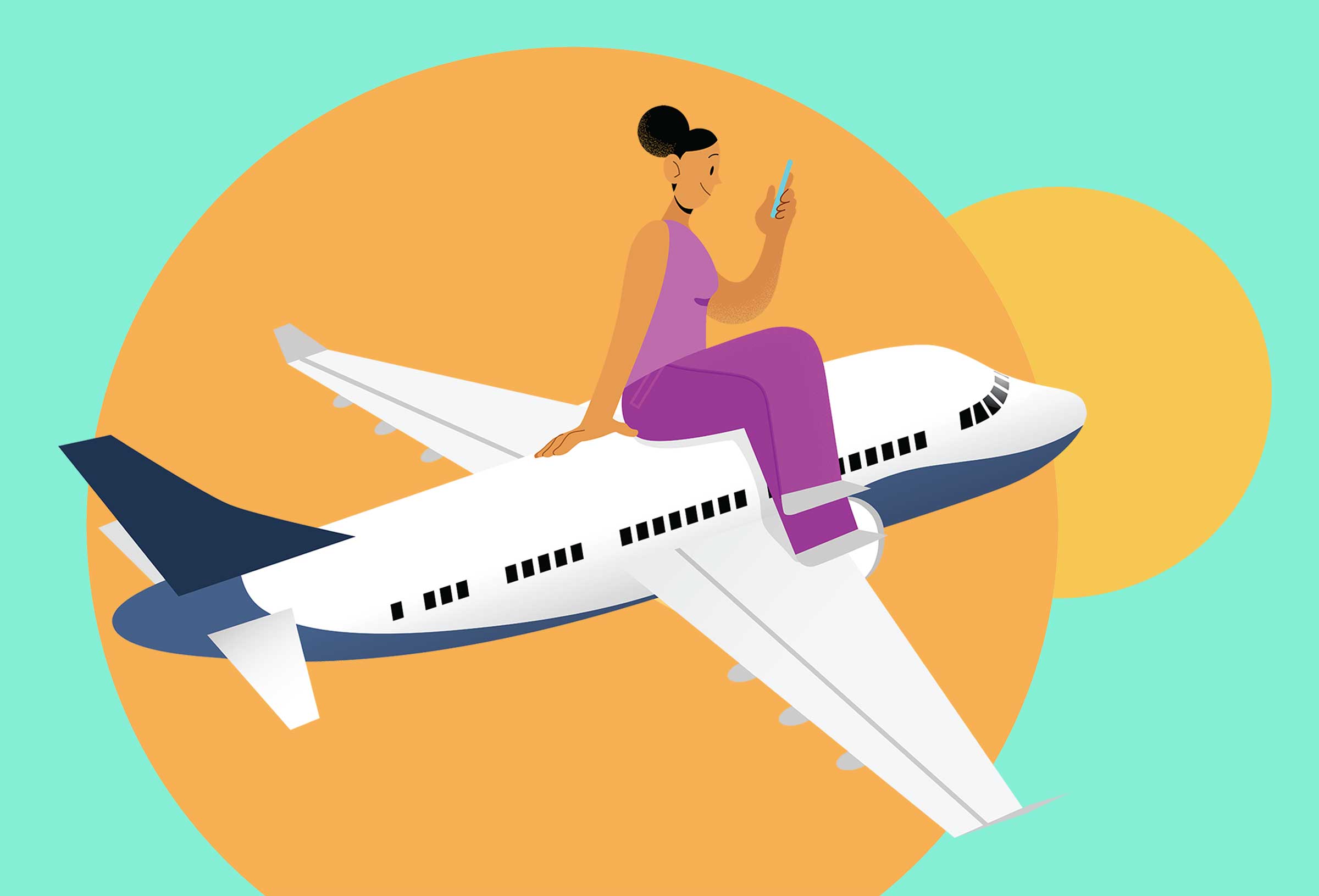
W hen Celia Quillian began planning her first trip since the pandemic in mid-March, she had a few criteria as she searched for the right destination— temperate weather in spring, not crowded with tourists, and within the U.S.
With all that in mind, Quillian, who lives in Atlanta, G.A., decided to try something new and plugged her wish list into ChatGPT. “I asked it to give me ten recommendations, just to see what it could do,” Quillian said.
The AI chatbot recommended several locations that fit the bill– including Puerto Rico, Charleston, S.C. and Palm Springs, Calif. Quillian, 31 , had been to a few of the destinations before and knew they fit the description of what she had asked for. “I was like okay, this thing is definitely working.”
She chose Puerto Rico and then used the chatbot to create a seven-day itinerary for her trip for the following month, prompting it to create a table describing potential activities and breaking them down by distance and cost. “It took me an evening to plan the trip versus weeks of research,” says Quillian, who shared her planning experience in a video that she says received over 2 million views on Instagram. Quillian is a product marketing manager who created the social media account, @smartworkAI, aimed at teaching people creative ways to use AI programs.
ChatGPT allows people to tailor their vacations based on who they’re traveling with or what activities they’re interested in—sourcing everything from activities for kids, to a list of top-rated coffee shops, says Frederic Gonzalo, a marketing consultant who specializes in the use of new technologies in travel. “Before ChatGPT and other [generative AI] tools, you’d have 50 people do the same 50 searches for a weekend in New York, and everyone would get the same results,” says Gonzalo. “Now it’s really going into this hyper-personalization and getting content adapted to everyone’s reality.”
More from TIME
In recent months, artificial intelligence, and how it stands to change daily life, has been at the center of public conversation. The travel industry is no exception—a third of travelers say they would use ChatGPT to plan their vacation, according to a tracking study by Longwoods International . Major companies are also beginning to use AI technology to provide destination suggestions to customers and streamline the booking process.
Travel Companies Utilizing AI
Major travel companies are getting in on the action. In April, Expedia launched a travel planner in their app powered by ChatGPT that recommends places to go and stay based on the conversations people have in the chat, and saves hotels mentioned during the chat for easy booking. Expedia also launched its own plugin for ChatGPT so travelers can start a conversation on the ChatGPT site and then select the Expedia plugin, which directs travelers to the company’s website to book the discussed trip.
Other companies are interested in following suit. Priceline , AirBnB , and Bookings.com have all signaled their interest in using AI to improve customer service or help plan trips as well.
And while AI is already in use in the travel industry, as machine learning is often used to predict customer behavior or provide more personalized recommendations, Gonzolo says that conversational AI tools might soon make customer service operations more sophisticated. “Chatbots on websites are really dry, and if you don’t answer the three or four preempted questions that are there, you’re sort of on your own,” he says. “So I think we’ll see much more sophisticated customer service tools that will be integrated on websites.”
Could AI Replace Travel Agents?
For now, Gonzalo says the AI’s tool’s main strength lies in helping travelers plan their trip or find activities at their destination, but it is not yet sophisticated enough to help with things like booking a flight, which is where a travel agent may still come in for some. And for others, the value of human connection or the fun in the process of planning traveling is important, says Erika Richter, VP of Communications & Marketing at the American Society of Travel Advisors.
“If you want a top 10 list of things to do or places to stay, it can spit out those answers for you. But can it tell you which of those experiences are actually authentic?” Richter says.
Though some have been quick to turn to ChatGPT for travel recommendations, Richter notes that travel agents are still in high demand. “Almost 30% of our travel advisors are saying that over half of their clients are working with a travel advisor for the first time,” she says. “Travel is becoming more complicated. People are wanting that personal touch.”
Richter thinks that AI will help automate simple bookings, like a trip home or business travel. “To that end, I think that it might make it faster and easier for those one-off bookings,” Richter says.
For travelers simply looking to get recommendations, Gonzalo also cautions against over-reliance on AI, which might be programmed using old information. (ChatGPT, for example, still has limited knowledge of data after 2021.) Users run the risk of being directed to a restaurant that’s out of business or an attraction that’s closed.
Quillian says that the tool remains useful because a city’s offerings don’t change much. “Sometimes [a city] will have something going on in the moment, but most of the time, the destinations and the attractions stay the same.”
Quillian adds that specificity was key to getting the tool to provide unique ideas. “If you’re looking for ‘tourist destinations in Puerto Rico’, it’s probably going to give you a similar assortment of things that you would get searching on Google,” she says. “But if you say ‘I’m trying to find some off the beaten path or hidden gems within the city that most people most tourists don’t visit’, it’ll probably be able to give you that too.”
Quillian found herself relying on the program throughout the trip, whether it was to help identify wildlife or better understand the local dishes on a restaurant’s menu.
“I speak to it like a friend or like an assistant,” she says. “It’s my own pocket travel guide.”
More Must-Reads from TIME
- The New Face of Doctor Who
- Putin’s Enemies Are Struggling to Unite
- Women Say They Were Pressured Into Long-Term Birth Control
- Scientists Are Finding Out Just How Toxic Your Stuff Is
- Boredom Makes Us Human
- John Mulaney Has What Late Night Needs
- The 100 Most Influential People of 2024
- Want Weekly Recs on What to Watch, Read, and More? Sign Up for Worth Your Time
Write to Simmone Shah at [email protected]

How AI can Impact the Travel Agents Role
Of all the incredible technologies to come about and affect the travel industry in recent decades, one of the biggest is artificial intelligence. Artificial intelligence, or AI, has started making huge inroads into the travel industry and, more specifically, helping travel agents better understand travel trends. Some travel agents and travel agencies fear that AI may entirely one day take over the human role that they play. These fears, however, are far overblown as artificial intelligence is a compliment to the human factor rather than a replacement, and the responsible use of artificial intelligence can make a travel agent’s job easier, make them more efficient, and help them understand the travel trends of their clientele better. So how has artificial intelligence changed and impacted the travel industry?
Dynamic pricing
One of the easiest and most visible ways that individuals, travel agencies, and the entire travel industry have been helped for the better with AI is with dynamic pricing. Every single time a hotel books a room at a given time and date, an airline sells a ticket for a specified time, or any other number of millions of data points, this data is collected and analyzed by artificial intelligence programs. These programs are designed to maximize money for their respective industries by changing prices to reflect a changing environment. This is the whole concept behind dynamic pricing.
This is why airline tickets and hotel rooms are often more expensive on the weekends than they are on the weekdays. This is why when there is going to be a big concert in town, rooms that are normally cheap are more expensive than they usually are. The dynamic pricing control by artificial intelligence knows or at least has a good indication, of the supply and demand for a given area under certain circumstances by observing travel trends from thousands or even millions of data points. This allows for pricing to be far more fluid than it was in the past which not only maximizes profits for the industries but also can score individuals some incredible deals especially when they use a travel agent.
Travel agents, oftentimes helped by dynamic pricing, have special deals and discounts with different hotel chains or other suppliers. So when people see a good deal, there is a possibility that their travel agent may be able to get them an even better one. Artificial intelligence is all well and fine but it’s the human relationships and the human component that enhance it just that much more.
Traveling assistance
Artificial intelligence that provides traveling assistance is a huge complement to a travel agent and not a hindrance. These travel assistance programs are available in a variety of applications such as Facebook Messenger, AI Travel Assistance, Slack, and others. Within these programs are chatbots which are designed to answer simple questions. This makes the traveler’s job far easier as now instead of having to contact their travel agent to ask readily-available questions, the digital travel assistant using AI is able to do that work for them.
This makes the mobile travel assistant an excellent first responder to simple questions that individuals need to know. This by no means replaces the travel agent but is a big compliment to them because the artificial assistant can be on the clock 24/7 whereas human agents need time to rest even though they can be accessed 24/7 through solutions like Travelport Mobile Agent . Not only that, but it also keeps travel agencies from having their agents tied up with simplistic questions about simple flight times or pricing for different areas and instead allows them to focus on deeper and more essential matters of travel such as helping find a unique kind of event or travel experience which may not be readily findable using a digital assistant.
Travel agents can also help when plans change and they are faster and better at helping make dynamic successful changes to ensure the happiness and the overall experience of a trip, or even help you to deal with a crisis situation . By letting artificial intelligence take on minor questions and minor day-to-day operations, human travel agents are far more available to work on those questions, projects, or plans that AI is simply not up to.
Recommendations and suggestions
This is another big one that artificial intelligence has helped within recent years and is one more huge complement to the travel industry and that is the ability to help clients make suggestions about where they may want to go. Artificial intelligence has come a long way from simply recommending previous trips you have gone on to now offering and suggesting trips you may like to go to based on your previous trip history or user experience. By using your publicly available data, the places where you have done Google searches for, or where you spent time on vacation websites, artificial intelligence is then able to use these data points to try and find a destination that meets all of your needs. Oftentimes this will combine things like the best pricing, the best time of year, availability of hotel accommodations, and the best flight times as a part of its recommendation.
For instance, if you have been looking for and doing web research on different tropical locations, do not be surprised if when you think about booking a ticket you get suggestions for some of the places you have visited and exceptional deals at that. This provides a sort of baseline for where to go and the general pricing available.
Even if one decides to book trips using AI recommendations, a travel agent still has an important role to play as travel agents can not only meet changing travel dynamics which artificial intelligence is still very poor at, but a travel agency can also help connect you with special local events or insider knowledge of places and people that AI lacks. People who work for travel agencies are often widely traveled and so they have a special kind of knowledge that complements artificial intelligence recommendations and can help ensure any trip is not only more secure but also that the experiences are richer.
In closing, artificial intelligence is not the enemy of the travel industry. Travel agents within the industry need to embrace technology as their friend and helper. By using advanced tech solutions like Travelport Mobile Agent , travel agents will have more time to focus on the human component of travel and ensure the personal touch on every trip that AI lacks.
Read also: How Travel Agents Win Over Self-Booking Tool
Check the Slideshare presentation:
Share this blog post on your social media or email it to a friend
Related posts.

The Future of the Travel Industry: Travel Trends That Will Shape the Next Decade

Secrets No One Tells You to a Seamless Travel Agency Workflow

5 Essential Tips for Travel Agents to Stand Out in a Crowded Market

TTS Products Update – March 2024

The Future of Travel Agents, will technology replace them?
Leave a comment cancel reply.
Advertisement
Supported by
Artificially Intelligent Help for Planning Your Summer Vacation
Travel-focused A.I. bots and more eco-friendly transportation options in online maps and search tools can help you quickly organize your seasonal getaway.
- Share full article

By J. D. Biersdorfer
J.D. Biersdorfer has been using smartphone apps for travel since the summer of 2007.
The summer travel season starts in just a few weeks, but if you are looking for software that goes beyond simply booking flights and hotels, you’re in luck. Search engines enhanced by artificial intelligence can help with your research and outline full itineraries. Certain older apps have recently been updated to suggest more eco-friendly travel options. And keeping it all organized on your phone is easier than ever. Here’s an overview.
Using an A.I. Travel Agent
General-purpose A.I.-powered search tools and chatbots like Google’s Gemini spin up a list of things to do on your vacation when asked, but A.I. bots that are fine-tuned for travel queries are often more comprehensive. These bots scout destinations, plan itineraries, search for accommodations and flights, map out road trips and do more — grabbing a lot of information at once and saving you all that time-consuming web trawling.
Give the software your specifics — like destination, length of stay, interests — and see what it suggests. Many A.I. helpers are free to use if you sign up for an account, but some charge a subscription fee for premium services; your app store has specifics.
Layla , formerly Roam Around, is one of the free vacation-oriented A.I. helpers you can find online, and it has teamed up with travel sites that include Skyscanner , Get Your Guide and Booking.com . If you prefer land-based car and camper journeys, Roadtrippers (free trial; $60 year) includes real-time traffic and air-quality information along with route planning. And old stalwarts like Tripadvisor and Expedia are now using A.I.-generated vacation builders.
But as others have also noted, while A.I. travel planners have much potential, many are still works in progress and usually display disclaimers admitting so.
A.I. bots have been known to offer generic advice like “enjoy lunch at a local restaurant,” suggest activities that are out of season or too far apart, repeatedly recommend the same restaurant, consistently steer you to their advertisers or point you to locations that have closed. If you ask different bots the same question, you may get nearly identical suggestions, all scraped from the same tourism websites.
Still, A.I. travel apps are improving as they learn, and can be useful for the trip research and coordination phase. Just be sure to double-check the bot’s work before you commit to a plan.
Finding Earth-Friendly Options
There’s no shortage of apps for booking transportation to your destination. But if you want to keep the environment in mind, recent updates to Google’s Maps and Search apps now suggest routes and methods that lower your personal impact on the planet.
Google for the past few years has been pointing people to flights with lower carbon emissions , alternative train routes , fuel-efficient driving directions and eco-friendly hotels . It is now expanding its walking, biking and public transit suggestions alongside car routes in several major cities and adding more electric-vehicle charging information. Google Flights shows jet emissions estimates . Google Search has a “consider taking the train” nudge with rail routes and prices under certain flight results.
Apple’s Maps app also shows mass transit , walking and cycling options for getting around town, along with charge-friendly routes for electric vehicles . However, the default apps on your phone are not the only aids. Third-party software for directions and sustainable travel abound.
For example, Citymapper, which covers most major cities in the United States, Europe and Asia, includes environmental impact statistics on some trips. Its directions often include accessibility options that avoid stairways , along with routes for the fastest, cheapest or easiest way to get where you’re going; Citymapper is free with in-app purchases.
Other apps available for those seeking environmentally minded vacations include Bikemap for community-sourced cycling routes around the world, HappyCow for vegan and vegetarian travelers and Tap Hydration and Water Stations to locate sources for refilling reusable water bottles.
Keeping Organized
If you don’t already have software for consolidating your trip information, your phone’s default apps can help. Electronic boarding passes, hotel reservations and advance tickets can be quickly added to the digital wallet on your phone; a pragmatic paper backup tucked in your bag is insurance. Google and Apple offer to automatically add reservations and events from email and messages to your calendar .
Free services like TripIt (and its phone apps ), TripCase (also with Android or iOS apps) and Wanderlog automatically put all your travel information in one place, typically by scanning the information in your confirmation emails. TripIt Pro , a $50-a-year subscription version, adds more features like seat, fare and airline-points trackers, as well as international travel tools and regional risk alerts like those for extreme weather that can affect airline schedules and public safety .
A.I. bots and travel apps will continue to evolve and, hopefully, make vacation planning even easier in the future. Just don’t forget to occasionally put the phone down and enjoy your time off once you get there.
J.D. Biersdorfer has been writing about consumer technology for The Times since 1998. She also creates the weekly interactive literary quiz for the Book Review and occasionally contributes reviews. More about J. D. Biersdorfer
Explore Our Coverage of Artificial Intelligence
News and Analysis
Ilya Sutskever, the OpenAI co-founder and chief scientist who in November joined three other board members to force out Sam Altman before saying he regretted the move, is leaving the company .
OpenAI has unveiled a new version of its ChatGPT chatbot that can receive and respond to voice commands, images and videos.
A bipartisan group of senators released a long-awaited legislative plan for A.I. , calling for billions in funding to propel U.S. leadership in the technology while offering few details on regulations.
The Age of A.I.
D’Youville University in Buffalo had an A.I. robot speak at its commencement . Not everyone was happy about it.
A new program, backed by Cornell Tech, M.I.T. and U.C.L.A., helps prepare lower-income, Latina and Black female computing majors for A.I. careers.
Publishers have long worried that A.I.-generated answers on Google would drive readers away from their sites. They’re about to find out if those fears are warranted, our tech columnist writes .
A new category of apps promises to relieve parents of drudgery, with an assist from A.I. But a family’s grunt work is more human, and valuable, than it seems.
Research Report
The art of AI maturity in travel
5-MINUTE READ

- AI is poised to be a force of change, improving traveler experiences and operational efficiency, empowering employees, simplifying logistics and more.
- Adapting with AI is critical now for travel companies because historical data is not as critical to the industry as it once was.
- Yet our research shows that very few travel companies have the AI maturity to unlock its full potential.
- Travel companies can learn from this small group of AI Achievers in this industry by prioritizing five success factors.
The race to embrace AI in travel is on
Our survey of travel executives—part of an extensive cross-industry analysis of over 1,600 C-suite executives and data science leaders from the world’s largest organizations—reveals that most travel organizations are barely scratching the surface in AI .
Just 13% of travel companies have the AI maturity today to unlock its full potential. We call them the AI Achievers. AI Achievers are different because they know that success with AI is a science and an art. It’s where the science of algorithms meets the art of organizational adaptation.
As early successes build confidence in AI as a value-driver broadly, we estimate that across industries, AI transformation will happen much faster than digital transformation—on average, 16 months faster. What does this mean for Travel specifically? It creates a clear sense of urgency for action.
After all, leaders haven’t forgotten what happened to Travel’s digital laggards. Those still in business today continue to play catch up.
There is growing consensus that AI is increasingly essential for competitive advantage in Travel.
What is AI maturity?
AI maturity is mastering a set of key capabilities in the right combinations across two categories:
- Foundational AI capabilities—cloud platforms and tools, data platforms, architecture and governance—that are to keep pace with competitors.
- Differentiation AI capabilities—AI strategy and C-suite sponsorship, combined with a culture of innovation that can set companies apart.
In all industries, AI Achievers’ commitment pays off in superior performance across financial metrics and beyond with 50% greater revenue growth.
Consider the breakdown of travel companies across these categories. AI Achievers (13%) show strength in both categories. AI Builders (7%) show strong foundational capabilities and average differentiation capabilities. AI Innovators (13%) show strong differentiation capabilities and average foundational capabilities. AI Experimenters (67%) have average capabilities in both. 1
View full chart
How to become an AI Achiever
Today’s Achievers have set the standard and are poised to remain leaders. They have demonstrated that excellence in areas like vision and culture are just as critical as algorithmic integrity. Our research uncovered five key success factors for Achievers.
Champion AI as a strategic priority: AI strategies need the support of the CEO and the entire executive suite.
Invest heavily in talent: The more proficient all employees are in AI-related skills, the easier it is for travel players to scale human and machine collaboration.
Industrialize AI tools/teams to create an AI core: A strong AI core is particularly important for travel companies because of how ecosystem dependent the industry is.
Design AI responsibly: As travel companies deploy AI for more tasks, adhering to laws, regulations and ethical norms is key to build a sound data and AI foundation.
Prioritize long and short term AI investments: Travel companies can support smaller AI initiatives that deliver cross-enterprise benefits without massive transformation efforts.
Practice makes progress
We are confident that travel companies can pursue these success factors and expect to see the share of AI Achievers in Travel increase rapidly and significantly, more than doubling to 26% by 2024. This is encouraging news for an industry looking to put COVID-headwinds completely behind.
This prospect raises a critical question of where travel companies should target AI investments as they increase their AI maturity. The most promising applications for AI in Travel in terms of transforming experiences include customized travel planning and online customer service through chatbots, face-to-face traveler service though robots, facial recognition and identity management through biometrics, and dynamic pricing and predictive data analytics through AI and machine learning.
Source: 1 Accenture Research
Related insights
- The Art of AI Maturity
- Building a data-driven travel company
- The right cloud mindset in travel
Sergiy Nevstruyev
Managing Director – Enterprise Architecture & Digital Transformation Lead
Rafael Pérez Martín
Managing Director – Data & AI

AI & The Future of Travel and Tourism: How AI Will Change the Industry
Home » AI & The Future of Travel and Tourism: How AI Will Change the Industry
AI & The Future of Travel
The travel and tourism industry is poised to undergo a massive transformation in the coming years. With the rise of artificial intelligence (AI), the possibilities for travelers and tour operators are endless. AI technology can be used to streamline the booking process, provide personalized recommendations, and create an even more immersive experience for guests.
This blog post will explore how AI will shape the future of travel and tourism, and the impact it will have on the industry as a whole.
✅ Get inspired and start planning your next adventure with Framey today!
Table of Contents
How will AI change the travel and tourism industry? Trends and Figures

How will AI change the travel industry
AI is rapidly changing the face of the travel and tourism industry. In recent years, AI technology has been implemented in almost all areas of the industry, from booking flights and accommodations to providing personalized recommendations for destinations. In addition, AI-driven systems have enabled more efficient operations for hotels, airlines, and other tourism companies, resulting in better service for travelers and increased revenues for businesses.
According to a report by Statista, AI is estimated to bring in $14.3 billion of revenue to the global travel and tourism industry by 2022. This growth is expected to continue as AI technology continues to improve and become more widely adopted.
Furthermore, a study by the World Travel & Tourism Council suggests that AI and Machine Learning could result in a $1 trillion boost in global economic activity from the travel and tourism sector by 2025. The study found that AI-enabled features such as smart personalization, automated customer service, voice recognition, virtual reality, and facial recognition are all expected to become more prevalent shortly.
AI technology is also helping to streamline operations for businesses in the travel and hospitality sector. For example, AI-driven systems can be used to automate processes such as customer service, hotel management, marketing and sales, air ticketing, and baggage handling. These systems can save businesses time and money while providing improved services to their customers.
AI is also becoming increasingly important in the travel sector due to its ability to provide personalized recommendations to travelers. AI-powered platforms such as Amazon Alexa and Google Home are now able to provide tailored suggestions for destinations, activities, restaurants, and hotels based on individual user preferences. Additionally, these platforms can be used to book flights, find information on attractions, and even offer local advice or assistance.
Overall, it is clear that AI technology is already having a significant impact on the travel and tourism industry and this trend is likely to continue in the years ahead. With AI-driven features becoming increasingly commonplace, travelers can expect more efficient services and better-personalized recommendations for future trips.
What are the benefits of using AI in travel and tourism?

Benefits of AI in tourism
AI technology has the potential to revolutionize the travel and tourism industry. By using AI, businesses can improve efficiency, lower costs, and provide enhanced customer experiences.
Here are just a few of the benefits of using AI in travel and tourism:
Automated Processes – AI & The Future of Travel
AI can be used to automate manual processes in the travel and tourism industry, such as booking flights and hotels or recommending restaurants. This can save businesses time and money, as well as reduce the number of errors in the process.
Improved Security
AI can also be used to enhance security in the travel and tourism industry by detecting fraudulent activity and malicious behavior. AI-driven facial recognition systems, for example, can help ensure that only authorized personnel have access to secure areas in airports and other travel destinations.
Enhanced Customer Experiences
AI can be used to personalize customer experiences by providing tailored recommendations based on their previous searches and preferences. For example, AI-based chatbots can offer personalized advice to travelers, suggesting attractions, hotels, and restaurants that they may be interested in.

AI and Customer Experiences
Accurate Predictions – AI & The Future of Travel
AI-driven analytics can help businesses in the travel and tourism industry make accurate predictions about customer demand and pricing. This can help them plan their marketing strategies and determine the best way to allocate resources.
By leveraging the power of AI, businesses in the travel and tourism industry can increase efficiency, reduce costs, and provide enhanced customer experiences. As AI continues to evolve and become more advanced, we will likely see even more innovative applications of this technology in the future.
Trending AI-Driven Innovations in Travel and Hospitality
The travel and hospitality industry is making great strides in the use of AI technology. AI-driven innovations are helping hotels, restaurants, airlines, and other travel-related businesses to provide better customer experiences.
AI-powered chatbots are becoming a popular tool for hospitality businesses, as they allow customers to quickly find the answers they need without having to contact customer service. Chatbots can also be used to provide personalized recommendations based on past experiences.
AI has also been used to create smarter search algorithms, helping customers find the best deals on flights and accommodation. By using predictive analysis, these algorithms can learn from past searches and suggest the most suitable options.
AI can also help hotel staff save time by automating tedious tasks such as check-in, check-out, and inventory management. AI can also help to improve security at hotels by using facial recognition software to identify potential threats.
It is also being used in restaurant kitchens to provide better customer experiences. Smart kitchen systems can provide more accurate cooking times, temperatures, and portion sizes, helping chefs create dishes with greater precision and accuracy.
AI is being used in the travel industry to create smarter navigation systems that can help travelers find their way around unfamiliar cities and locations. These systems can also provide insights into traffic patterns and offer personalized route recommendations for commuters.
Finally, AI is being used in marketing efforts to track customer behavior and personalize offers. By tracking customer interactions, AI can help companies target their campaigns to the right people and ensure they are always offering the best deals.
The Most Popular AI Use Cases in Travel and Tourism – AI & The Future of Travel

Most Popular AI Use Cases
- Smart booking assistants
- Personalized recommendations
- Flight forecasting
- Facial recognition
- Baggage handling systems
- Robotized self-service
AI has had a profound impact on the travel and tourism industry, revolutionizing customer experience and streamlining processes. Let’s take a closer look at some of the most popular AI use cases in this sector.
– Smart booking assistants have become a necessity in today’s digital world. Utilizing AI-powered chatbots, customers can quickly search for relevant information, book flights or accommodation, find deals, and even get personalized recommendations in just a few clicks. Chatbot technology is making it easier than ever for travelers to quickly access the information they need and make informed decisions.
– Personalized recommendations are also enabled by AI. By leveraging big data and machine learning, companies can now offer customized experiences tailored to individual users. Through predictive analytics, customers can be presented with options that match their past preferences and interests. This not only helps them find the best deals but also enhances their overall experience.
– AI is also making it easier for travelers to plan trips and compare prices. Flight forecasting systems utilize machine learning algorithms to forecast airline prices in real-time, allowing customers to get the best possible deals.
– Similarly, facial recognition technology can be used to speed up the check-in process at airports, reducing the amount of time spent waiting in queues.
– Baggage handling systems have been automated using robotics and AI. These systems can automatically track and locate lost luggage, making the process of retrieving items much easier.

AI and Baggage handling systems
– Additionally, self-service kiosks are becoming increasingly popular in airports and hotels, with robotized technology helping to expedite check-in and check-out processes.
The use of AI in travel and tourism has created numerous benefits for both businesses and customers. AI is making travel easier and more efficient than ever before, while simultaneously improving customer experience.
From smart booking assistants to facial recognition technology, AI is revolutionizing how we travel.
The Future of AI and Machine Learning in the Travel Industry

The Future of AI and Machine Learning
Artificial Intelligence (AI) and Machine Learning (ML) are becoming increasingly popular in the travel and tourism industry as companies seek to increase efficiency and provide better services to customers. AI and ML technologies offer a wide range of possibilities for travel businesses to make customer experiences more seamless, personalized, and efficient.
AI and ML can be used to help streamline the booking process, such as with the development of chatbots that can answer customer questions and guide them through the process. Additionally, AI can help analyze customer data to create hyper-personalized experiences based on their preferences and interests. AI can also be used to automatically track and monitor customer service complaints, helping businesses improve customer satisfaction.
AI and ML are also being used to improve search engine optimization (SEO) for travel companies. AI-driven SEO tools can analyze the behavior of potential customers, making it easier to tailor web content and target those who are most likely to make a purchase.
Another important application of AI and ML in the travel industry is forecasting. AI-powered forecasting tools are being used by airlines, airports, and hotel chains to forecast customer demand and prepare accordingly. AI models can also be used to predict flight delays and suggest alternative routes, resulting in fewer customer delays.
Occupancy prediction is another area where AI and ML are proving invaluable for travel businesses. With this technology, hotels can accurately predict room occupancy levels and set prices accordingly, allowing them to maximize their profits.
Finally, AI-enabled translations are revolutionizing the way customers interact with travel companies. With AI-powered natural language processing (NLP) technologies, travel companies can quickly translate websites, emails, documents, and customer service conversations into multiple languages. This technology has already been adopted by many airlines, hotels, and travel agencies.
In conclusion, AI and ML are playing an increasingly important role in the travel and tourism industry. These technologies are helping companies deliver more personalized experiences, automate processes, reduce costs, and improve customer satisfaction. As these technologies become more advanced, we will continue to see them become an integral part of the travel industry.
Occupancy prediction – AI & The Future of Travel

Using AI and machine learning algorithms, hotels can forecast occupancy rates with greater accuracy and better anticipate customer needs. This helps them to adjust their pricing policies and optimize bookings for maximum profitability. By using advanced analytics, hotels can determine the most profitable rates for certain seasons or times of the year. They can also identify trends in customer preferences and tailor services accordingly.
Occupancy prediction is also essential for predicting customer demand, which is essential for efficient supply chain management. By anticipating customer demand, hotels can effectively stock the necessary supplies needed for each guest. This helps them to minimize their costs and maximize their profits.
The use of AI for occupancy prediction is becoming increasingly popular as hotels strive to optimize operations and increase efficiency. The technology has helped the hospitality industry reduce costs, improve customer experience, and boost profitability. As this technology continues to evolve, it is expected to revolutionize the way hotels do business in the years to come.
Artificial Intelligence of Things (AIoT)

The concept of Artificial Intelligence of Things (AIoT) is becoming increasingly popular in the travel and tourism industry. AIoT is a combination of Artificial Intelligence (AI) technologies and the Internet of Things (IoT). It promises to bring about a transformation in the way we experience travel, from smarter booking assistants to personalized recommendations and flight forecasting.
AIoT has the potential to make all aspects of travel easier and more enjoyable for customers. AIoT technologies can be used to automate manual processes, such as baggage handling systems, facial recognition, and robotized self-service. This type of automation increases efficiency, reduces operational costs, and improves customer service. AIoT can also provide valuable insights into customer behavior, which can be used to personalize services and improve user experience.
AIoT has already been deployed in many sectors of the travel and tourism industry. For example, some airports have implemented facial recognition technology to streamline the check-in process and reduce wait times. Hotels have also begun using AIoT technologies to improve their guest experience, with smart devices providing personalized suggestions on entertainment, dining options, and other amenities.
As AIoT continues to evolve, it will continue to revolutionize the travel industry. With its ability to make operations more efficient, enhance customer service and improve user experience, AIoT is sure to shape the future of travel.
Hyper-Personalization – AI & The Future of Travel

For example, hotels can use hyper-personalization to recommend activities, dining options, and amenities based on the traveler’s past behavior and preferences. Airlines can use AI-powered chatbots to engage customers throughout their journey, from booking to the time of departure. And retail stores in tourist destinations can offer personalized discounts based on the customer’s purchase history and location.
By providing a more personal touch and anticipating customer needs, travel, and hospitality companies can differentiate themselves from the competition and create memorable customer experiences. Moreover, hyper-personalization can lead to increased sales, higher customer loyalty, and improved customer satisfaction levels.
NLP for Exquisite Translation Services
Natural language processing (NLP) is one of the most important applications of AI in travel and tourism. With NLP, travel and hospitality businesses can offer highly precise and efficient translations of their content into multiple languages. This helps make their services more accessible to customers all around the world.
For instance, a hotel chain may need to translate its website into multiple languages to target different audiences. With NLP, they can do so with greater accuracy and faster turnaround times. It can also enable travel agencies to provide multilingual customer support services, further enhancing customer satisfaction.
Moreover, NLP can also be used to generate accurate translations of online reviews from customers from different countries. This can help travel businesses better understand their customer’s experience, enabling them to provide more tailored services.
In conclusion, NLP is an incredibly powerful tool for the travel and hospitality industry. It enables companies to offer more precise translations of their content, as well as customer support in multiple languages. It also helps them understand customer reviews better, allowing them to deliver more tailored services to customers from all over the world.
Final Thoughts – AI & The Future of Travel

At the same time, advancements in AI-driven technologies have also enabled a new level of personalization in the travel industry; with AI-driven applications like occupancy prediction and Hyper-Personalization paving the way for a more tailored and individualized experience. AI is also playing a role in providing exquisite translation services through Natural Language Processing.
AI has undeniably revolutionized the travel industry and will continue to do so in the future.
If you’re looking for inspiration for your next trip, be sure to check out Framey App . With its intuitive design and powerful search capabilities, Framey can help you discover new places and experiences that you wouldn’t have been able to access before.
So don’t miss out – get inspired and start planning your next adventure with Framey today!
Larisa Negreanu
Previous post top 10 pet-friendly restaurants in london that you and your furry friend will love, next post what mobile crypto mining project is best for you a comparison of pi, bee, and ice, copyright © 2023.
Framey Technologies Limited
[email protected]
Transform dream photos into memorable trips
Mindtrip wants to become your AI travel agent
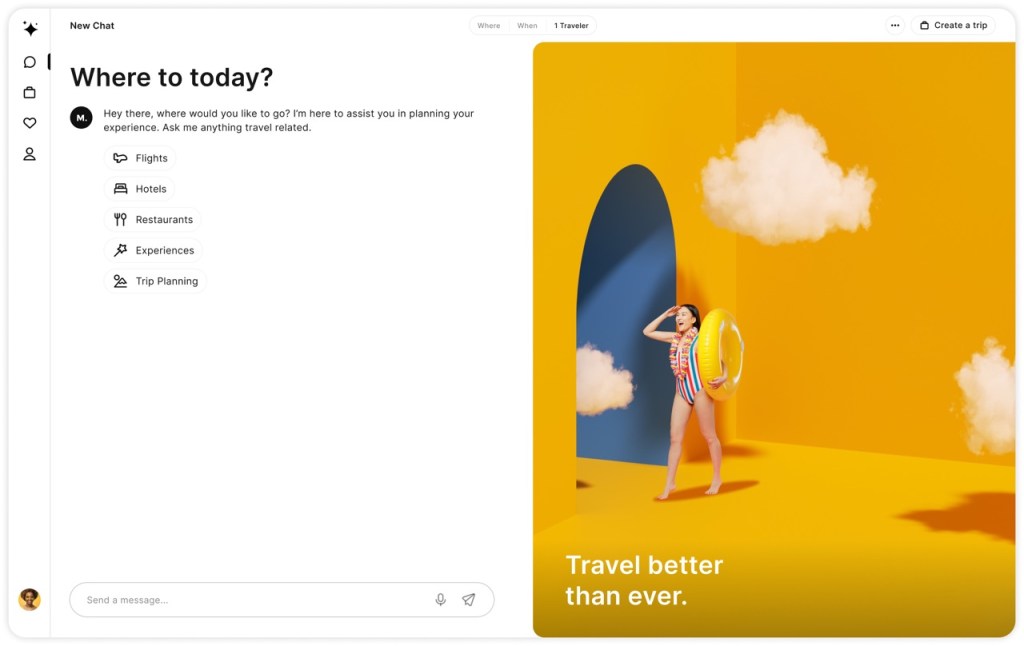
Once upon a time, we used to use travel agents to book our flights, book our hotels and maybe even make recommendations about things to do and places to eat while you were away. But then along came the internet and the ability to book your own flights, and Airbnb or Vrbo for your accommodation, and then between Instagram and TikTok what to do and where to eat was covered. Travel all became a lot more self-service.
But a group of 12 experienced founders recognized that there was a gap in the market: a way of ensuring that trip planning and booking happened all in one place, with a sense of purpose and advice, but without a human travel agent. Instead, it was AI in the driving seat. It’s called Mindtrip and it has just raised $7 million in seed funding from Costanoa Ventures to help carve out its own chunk of the 10% of the economy that’s spent on travel and hospitality.
Mindtrip’s CEO is Andy Moss, a serial entrepreneur who built and sold Roadster, FabKids, PopSugar and ShopStyle. Others alongside him include his co-founder at Roadster, Trey Matteson, and Garrick Toubassi, who previously led the Gmail engineering team at Google, where he was an early implementer of AI and applying large language models at scale.
Between them they recognized not just the popularity of travel as a popular topic on ChatGPT, but that it could go so much further than that. Natural language is the perfect way to bring together travel organization: People can ask questions and receive answers and suggestions while a more sophisticated AI mechanism can provide imagery, maps and availability and booking information.
“One of my other co-founders said: ‘Andy, what I really miss is actually having a travel agent. Twenty years ago, there was somebody that actually helped us plan a trip,’ said Moss, when talking to TechCrunch, “And then, this kind of light bulb just went on.”
Moss showed me an MVP of the software, which looked astonishingly good. By coincidence, the company’s so-far limited dataset for testing purposes includes the Hawaiian islands. In front of my eyes, the AI planned out a trip almost exactly like one we did with my family for my 40th birthday — except in seconds, rather than hours of research, and making it extremely easy to book, schedule and plan the whole thing. In a nutshell, it’s one of the best demos of AI I’ve seen to date, with an interface that makes a lot more sense than a lot of the text-forward interfaces we have seen so far.
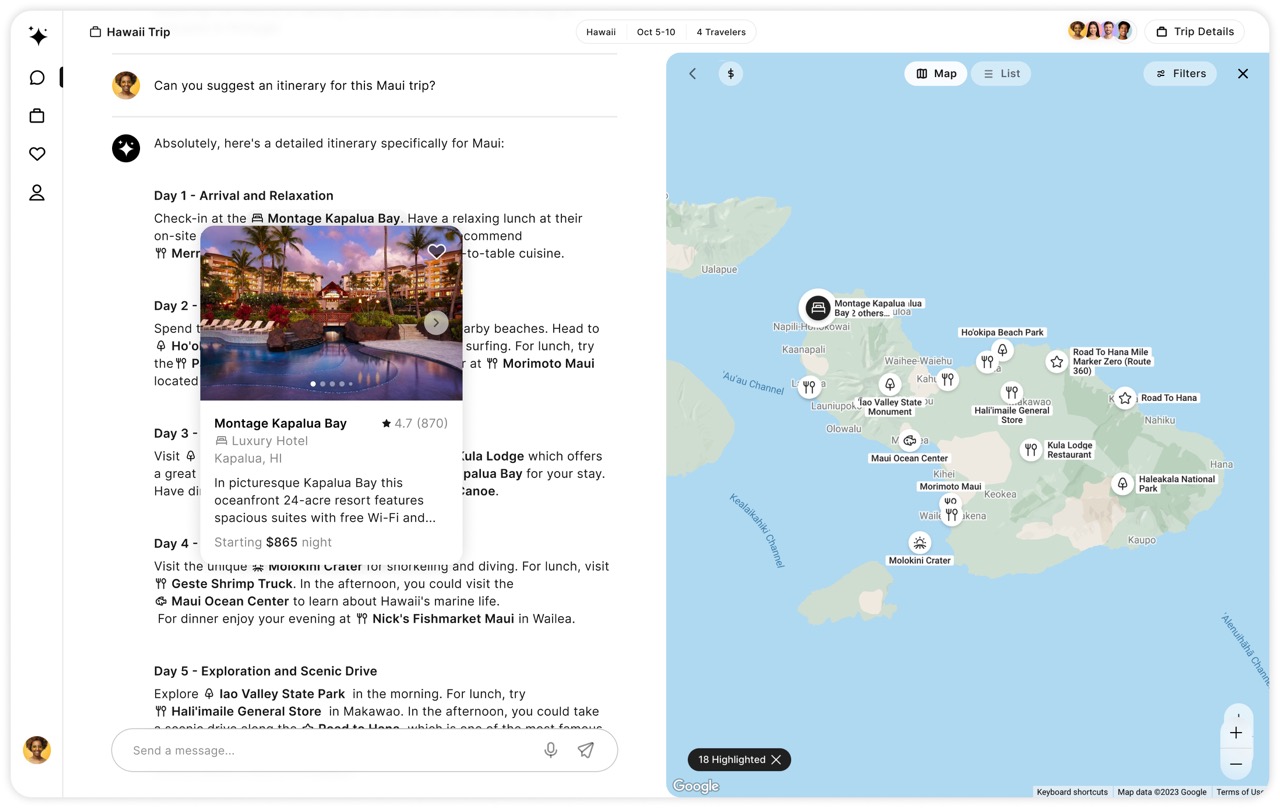
Mindtrip will go into public beta toward the end of 2023. Then, you will be able to build and organize trips with it by asking it questions to which it can add imagery, geographical, time and availability information pertinent to where you’re thinking of going.
It’s aimed at meeting the needs of travelers who are inspired by TikTok and Instagram, those who have everything planned out to the most minute detail, and anyone who loves an adventure but likes it planned.
“The sort of concept behind Mindtrip is how do you use ChatGPT natural language,” said Moss, “But with a built-in killer consumer-facing interface that really ties in maps and data cards and flight schedules and takes it all the way through the booking.”
That’s exactly what Mindtrip is aiming to offer: an AI assistant that can provide you with travel data that includes maps with suggested places to visit, travel availability, the ability to book restaurants and activities, all managed within a personalized itinerary or schedule.
More TechCrunch
Get the industry’s biggest tech news, techcrunch daily news.
Every weekday and Sunday, you can get the best of TechCrunch’s coverage.
Startups Weekly
Startups are the core of TechCrunch, so get our best coverage delivered weekly.
TechCrunch Fintech
The latest Fintech news and analysis, delivered every Sunday.
TechCrunch Mobility
TechCrunch Mobility is your destination for transportation news and insight.
OpenseedVC, which backs operators in Africa and Europe starting their companies, reaches first close of $10M fund
Founder-market fit is one of the most crucial factors in a startup’s success, and operators (someone involved in the day-to-day operations of a startup) turned founders have an almost unfair advantage…

Pine Labs gets Singapore court approval to shift base to India
A Singapore High Court has effectively approved Pine Labs’ request to shift its operations to India.

UK opens office in San Francisco to tackle AI risk
The AI Safety Institute, a U.K. body that aims to assess and address risks in AI platforms, has said it will open a second location in San Francisco.

Why companies are turning to internal hackathons
Companies are always looking for an edge, and searching for ways to encourage their employees to innovate. One way to do that is by running an internal hackathon around a…

Featured Article
I’m rooting for Melinda French Gates to fix tech’s broken ‘brilliant jerk’ culture
Women in tech still face a shocking level of mistreatment at work. Melinda French Gates is one of the few working to change that.

Blue Origin successfully launches its first crewed mission since 2022
Blue Origin has successfully completed its NS-25 mission, resuming crewed flights for the first time in nearly two years. The mission brought six tourist crew members to the edge of…

Hollywood agency CAA aims to help stars manage their own AI likenesses
Creative Artists Agency (CAA), one of the top entertainment and sports talent agencies, is hoping to be at the forefront of AI protection services for celebrities in Hollywood. With many…

Expedia says two execs dismissed after ‘violation of company policy’
Expedia says Rathi Murthy and Sreenivas Rachamadugu, respectively its CTO and senior vice president of core services product & engineering, are no longer employed at the travel booking company. In…

OpenAI and Google lay out their competing AI visions
Welcome back to TechCrunch’s Week in Review. This week had two major events from OpenAI and Google. OpenAI’s spring update event saw the reveal of its new model, GPT-4o, which…

With AI startups booming, nap pods and Silicon Valley hustle culture are back
When Jeffrey Wang posted to X asking if anyone wanted to go in on an order of fancy-but-affordable office nap pods, he didn’t expect the post to go viral.

OpenAI created a team to control ‘superintelligent’ AI — then let it wither, source says
OpenAI’s Superalignment team, responsible for developing ways to govern and steer “superintelligent” AI systems, was promised 20% of the company’s compute resources, according to a person from that team. But…

VCs and the military are fueling self-driving startups that don’t need roads
A new crop of early-stage startups — along with some recent VC investments — illustrates a niche emerging in the autonomous vehicle technology sector. Unlike the companies bringing robotaxis to…


Deal Dive: Sagetap looks to bring enterprise software sales into the 21st century
When the founders of Sagetap, Sahil Khanna and Kevin Hughes, started working at early-stage enterprise software startups, they were surprised to find that the companies they worked at were trying…

This Week in AI: OpenAI moves away from safety
Keeping up with an industry as fast-moving as AI is a tall order. So until an AI can do it for you, here’s a handy roundup of recent stories in the world…

Adobe comes after indie game emulator Delta for copying its logo
After Apple loosened its App Store guidelines to permit game emulators, the retro game emulator Delta — an app 10 years in the making — hit the top of the…

Meta’s latest experiment borrows from BeReal’s and Snapchat’s core ideas
Meta is once again taking on its competitors by developing a feature that borrows concepts from others — in this case, BeReal and Snapchat. The company is developing a feature…
Startups Weekly: It’s the dawning of the age of AI — plus, Musk is raging against the machine
Welcome to Startups Weekly! We’ve been drowning in AI news this week, with Google’s I/O setting the pace. And Elon Musk rages against the machine.

IndieBio’s SF incubator lineup is making some wild biotech promises
IndieBio’s Bay Area incubator is about to debut its 15th cohort of biotech startups. We took special note of a few, which were making some major, bordering on ludicrous, claims…

YouTube TV’s ‘multiview’ feature is now available on Android phones and tablets
YouTube TV has announced that its multiview feature for watching four streams at once is now available on Android phones and tablets. The Android launch comes two months after YouTube…

Two Santa Cruz students uncover security bug that could let millions do their laundry for free
CSC ServiceWorks provides laundry machines to thousands of residential homes and universities, but the company ignored requests to fix a security bug.

Harness the TechCrunch Effect: Host a Side Event at Disrupt 2024
TechCrunch Disrupt 2024 is just around the corner, and the buzz is palpable. But what if we told you there’s a chance for you to not just attend, but also…

Pitch Deck Teardown: Goodcarbon’s $5.5M seed deck
Decks are all about telling a compelling story and Goodcarbon does a good job on that front. But there’s important information missing too.

Slack under attack over sneaky AI training policy
Slack is making it difficult for its customers if they want the company to stop using its data for model training.

Healthcare company WebTPA discloses breach affecting 2.5 million people
A Texas-based company that provides health insurance and benefit plans disclosed a data breach affecting almost 2.5 million people, some of whom had their Social Security number stolen. WebTPA said…

Microsoft dodges UK antitrust scrutiny over its Mistral AI stake
Microsoft won’t be facing antitrust scrutiny in the U.K. over its recent investment into French AI startup Mistral AI.

Embedded finance is still trendy as accounting automation startup Ember partners with HSBC UK
Ember has partnered with HSBC in the U.K. so that the bank’s business customers can access Ember’s services from their online accounts.

Kudos lands $10M for an AI smart wallet that picks the best credit card for purchases
Kudos uses AI to figure out consumer spending habits so it can then provide more personalized financial advice, like maximizing rewards and utilizing credit effectively.

EU warns Microsoft it could be fined billions over missing GenAI risk info
The EU’s warning comes after Microsoft failed to respond to a legally binding request for information that focused on its generative AI tools.

A US Trustee wants troubled fintech Synapse to be liquidated via Chapter 7 bankruptcy, cites ‘gross mismanagement’
The prospects for troubled banking-as-a-service startup Synapse have gone from bad to worse this week after a United States Trustee filed an emergency motion on Wednesday. The trustee is asking…

Seraphim’s latest space accelerator welcomes nine companies
U.K.-based Seraphim Space is spinning up its 13th accelerator program, with nine participating companies working on a range of tech from propulsion to in-space manufacturing and space situational awareness. The…

Human-sounding AI can plan, help book your travel. But can you trust it?

It wasn’t so long ago that travelers planned trips without the internet.
“Back in the day, our parents used to go to these travel agents and really kind of express what they were looking for and what kind of vacation they wanted,” said Saad Saeed, co-founder and CEO of Layla, an AI travel planner whose website launched this year. “Slowly, we kind of acclimatized ourselves to start using these search boxes, clicks, these forms and filters.”
Artificial intelligence-driven tools like Layla can now turn back the clock on that experience, engaging with users almost like humans to customize travel plans with lightning speed plus all the resources of the web. But does AI actually make travel planning easier and can it compare to human expertise?
Yes and no. Here’s why.
Can AI actually understand us?
It can try.
“What are you personally looking for in this trip and what do you want out of it?” asked Saeed. “Do you want to reconnect with your partner, for example, or do you want to just feel some adventure and thrill?”
A human travel agent may ask a series of questions to understand a client’s needs. So can generative AI , which picks up on keywords. Mindtrip, an AI planner launched publicly on May 1, has an actual travel quiz that asks users to rank priorities like “Is your ideal vacation day an exhilarating adventure or a relaxing break?” using sliding scales.
“What we get at the end of that quiz, using the AI, is a really customized description,” explained Mindtrip Founder and CEO Andy Moss. That then informs what the AI suggests to the traveler.
Informed suggestions can save users time in narrowing down destinations and experiences, as well as introduce places users may never have discovered on their own.
AI travel planning is here: How to use it to plan your next vacation and what you should know first
Can AI fully replace humans?
No. Layla may sound human, using conversational phrases like “I've got three cozy nests that won't make your wallet cry.”
“She has a personality. We try to make her funny and so on, where it's really that friend that can get to know you and then recommend you the perfect stuff,” Saeed said.
But part of Layla’s expertise comes from the real-life experiences of some 1,600 travel content creators the Berlin-based platform has partnered with. Their videos and insights can give users a richer picture of what to expect.
Mindtrip also leans on human expertise, having tapped a limited group of travel influencers for curated content with plans to eventually open it up so anyone can share their travel itineraries and experiences with the public.
Story continues below.
Is AI a threat to privacy?
With all the rapid advancements in AI in just the past year, some users are wary of its safety .
“Data privacy is definitely one of our biggest concerns, and we ensure that none of the personal identifiable information ever reaches basically the model providers. That will all stay with us,” Layla’s Saeed said. “None of their personally identifiable data can ever be basically used to profile them or basically go into any of these systems, which are training these different models.”
Booz Allen Hamilton, the nation’s largest provider of AI to the federal government , focuses heavily on ethical and secure AI, as well as adhering to the government’s policies on data collection.
“We collect as little information as we can in order to provide a secure transaction,” said Booz Allen Hamilton Senior Vice President Will Healy, who heads up their recreation work, including Recreaton.gov , the government’s central travel planning site for public lands like national parks. “We don't save your searches. We don't save your credit card data. We're very careful about the data that we store.”
Yoon Kim, an assistant professor in MIT’s Electrical Engineering and Computer Science Department and Computer Science and Artificial Intelligence Laboratory , isn’t too worried about security in the initial brainstorming stages of travel planning with AI.
“I don't see, at this point, how AI-generated advice is spiritually different from travel guide articles that you might read on certain websites,” he said. “Travel planning is one really nice use case of these models, as narrow as it is, because it's a scenario in which you want to be given ideas but you don't actually need to commit to them.”
What’s next for AI?
Things could be different, though, if AI is used beyond trip planning. Deloitte sees AI being woven into all parts of travel.
“There is an opportunity for a real engine – I'm going to just use a generic term, engine – that allows you to search and pull it all together and to sort based off of your personal reasons for prioritization and then not stopping at ‘hey give me a list’ or ‘here's what to do,’ but ‘OK, now go create my itinerary, help me book it, track it all the way through that travel process,” said Matt Soderberg, principal, U.S. airlines leader for Deloitte.
Deloitte’s Facing travel’s future report, released in early April, identifies seven stages where AI can intersect with a trip, from personalized recommendations based on past travel, online purchases and tendencies to day-of issues to a post-travel pulse, where travelers may be asked about their experience and start thinking about future trips.
“When you solve across all of those, that's going to be the Holy Grail,” Soderberg said. “The difficulty is that doesn't all sit in one place. And so how do you get the right information and the right data to bring all of that together for a single experience for the consumer? And who's going to own that?”
Layla and Mindtrip, among others, already offer booking through partners like Booking.com. “It's all about making things actionable,” Moss said.
But for now, if issues come up mid-trip, AI tools can’t fix them like humans can. Humans still have to get involved.
6 Examples of How AI is Used in the Travel Industry
What is AI?
How is ai changing the travel industry, ai trends in travel industry for 2021 and beyond.
AI has made advances in many industries since it was invented. The ever-changing travel industry is also taking advantage of AI to revolutionize the way it operates. As a result, nowadays, travel companies highly leverage AI-powered tools and solutions for various processes from travel planning to landing in the destination.
Here in this article, you will learn how AI has transformed the lucrative travel industry, using example applications. We will also discuss the advances in AI that travel companies should be aware of in order to stay competitive in the industry.
Artificial Intelligence or AI is a branch of computer science where machines and computers simulate human intelligence [1]. In AI, machines are programmed to think like humans and perform tasks that only humans can do. Furthermore, It leverages the problem-solving and decision-making capabilities of human beings [2].
AI is not just a single technology but a rapidly evolving collection of technologies like deep learning, machine learning, and expert systems. For example, AI systems such as self-driving cars and space-exploring robots learn from the experience. Today there is ongoing research on the applicability of more advanced AI technologies like Generative Adversarial Networks and Edge AI in various industries.
The role of AI in tourism has become increasingly significant, transforming everything from travel planning to the customer experience at the destination. By simulating human intelligence, AI provides innovative solutions that enhance operational efficiency and enrich the traveler’s experience, highlighting the importance of adopting these technologies in the tourism industry.
Currently, AI has been incorporated into many areas of the travel and tourism industry, making lives easier for travelers around the globe. For instance, there are some widely used forms of AI in airports these days, such as facial recognition systems and airport security scanning devices.
Next, we will discover how AI applications are used in the travel industry using real-life examples.
Incorporating AI in tourism has not only revolutionized how tour operators interact with their clients but also how they personalize offerings and services. Virtual assistants and chatbots are prime examples of how AI facilitates more efficient and personalized booking processes, offering travelers options that best suit their needs and preferences .
AI Assistants For Travel Booking
Thanks to AI, travelers no longer need to visit travel agencies to book flights or search for accommodation. AI assistants and Intelligent chatbots have now taken the place of travel agents allowing travelers to book flights and accommodations and hire vehicles online. These chatbots are deployed in social media sites like Facebook messenger, skype, WhatsApp, and Viber to offer users a more personalized booking experience.
The travel reservation giants like Booking.com , Skyscanner , and Expedia are utilizing such chatbots in their operations. Usually, you will be prompted to start the conversation with a chatbot by entering the details of your intended journey. Then the bot will search through the booking sites and find you the best deal. For example, let’s see how Skyscanner uses its chatbot [3]
Skyscanner Chatbot
When the Skyscanner chatbot is activated on Facebook or Whatsapp, users can enter their destination to start the conversation with the bot. If you are unsure where to go, just type ‘anywhere,’ and then the bot will provide you with suggestions, including the price for each destination using real-time search trends.
When you tell the chatbot the travel date, it will show you the cheapest flights to your destination. Then the bot will redirect you to the official Skyscanner website to complete the booking upon selecting to book a flight. Moreover, the Skyscanner chatbot allows you to receive price alerts for a flight. Skyscanner reported that it had surpassed one million traveler interactions with the application in February 2018 [4]. Refer to the following videos on how this robot works.
- Skyscanner on facebook
- Skyscanner on Skype
Robots For Face-to-Face Customer Services
Robots are gradually infiltrating customer services in the travel industry, avoiding the need for human agents. Gone are the days when you had to wait in a queue to get information or try to find your gate in a busy terminal. The reason is that some popular airports and hotels have now employed robots to assist you in such situations. One example is the robot in London Heathrow airport that guides passengers in terminals [9]
According to a report published by Vero Solutions, it is expected that robots will replace humans in the check-in process by 2030 [5]. The Henn-na Hotel in Nagasaki is the worlds’ first hotel fully staffed by multi-lingual robots primarily used for check-in and checkout processing. Another innovative AI solution is ‘Connie,’ the robot deployed in the hotel Hilton McLean in Virginia.
The use of robots in the tourism sector illustrates the advancement of AI in tourism, providing innovative customer services. These robots not only streamline the check-in and check-out process at hotels and airports but also act as concierges, enhancing guest interaction with immediate responses and personalized assistance.
Connie, The Robot Concierge at Hilton
Connie uses domain knowledge of the IBM Watson AI program and Wayblazer to answer human queries related to hotel features and local attractions while providing recommendations. It uses Natural Language Processing to understand the sentences when someone talks to them.
Furthermore, Connie can move its arms and legs to show directions to guests and express different human emotions by lighting up with different colors. It continuously learns from human interactions and fine-tunes its capabilities. It is indeed an enjoyable experience for guests and particularly useful in this Covid-19 era to ensure customer safety.
AI-Driven Applications For Flight Forecasting
The application of AI in tourism extends to flight price prediction, where advanced algorithms analyze historical price patterns to offer travelers the best time to book. This innovation not only optimizes the booking experience for the user but also allows airlines and hotels to adjust their pricing strategies in real-time.
Imagine an innovative technology that helps you find the best flight price at the right time and gives you a heads-up on future flight prices. Some companies have made that useful feature a reality by introducing AI-driven smart price prediction applications into the industry. Hopper is an example of such an application used by travelers to get to that facility.
Hopper is based on machine learning algorithms. It uses a flight database to predict optimal hotel prices and flights while offering users personalized recommendations about the most suitable time to book a flight. When a traveler is tracking a flight, it provides recommendations on whether he/she should buy it now or wait for a better price.
Hoppers’ extensive database consists of trillions of historic flight prices, and live price feeds to work out recommendations. It is reported that this app has sold more than $600 million worth of flight tickets since its invention [6]. Hotels and airlines use these forecasting applications to modify rates according to consumer demand.
Data Analytics To Identify Valuable Insights
A huge amount of data is being generated every second throughout the travel industry. These data can be hidden gems for travel companies if they can interpret them effectively and identify what has worked well for customers. Travel companies leverage AI to sort through these vast data sets quickly and accurately, which would otherwise become a daunting task for humans alone.
For Instance, consider the use of AI in the Dorchester Collection hotel to conclude its collection of customer data. [7]
Data Analysis in Dorchester Collection Hotel
The Dorchester Collection hotel has processed and analyzed customer feedback surveys, customer reviews, and online polls using its AI platform Metis to determine its overall performance. They have discovered the lack of loyalty to their hotels through such analysis. Businesses get the opportunity to devise better solutions that fulfill customer needs by identifying such trends of customers.
Sentiment Analysis Through Social Media
Social media is listening to you all the time. Airlines and hotels are leveraging this technology coupled with AI to identify the sentiment of travelers through social media and how it relates to the traveler’s journey. For instance, if a customer posts about a particular flight delay on social media expressing his or her frustration, a listening tool will analyze it and interact with the customer in real time. Mindtree’s PaxPulse uses this sentiment analysis to deliver a better customer experience to its travel partners.
Mindtree’s PaxPulse
Mindtree’s PaxPulse is a social Intelligence and Recommendation Platform designed for the airline industry. It uses Mindtree’s pre-built classifiers, algorithms, and machine learning frameworks. When a particular passenger posts on social media about his travel partner, its smart algorithms process this sentiment and provide a certain recommendation to resolve passenger concerns.
Room Mapping + Dynamic Price Tracking
Here at HotelMize, we are using AI for our Room Mapping to track dynamic prices for the same room across multiple suppliers. When adding AI also to predict dynamic prices for a specific room, we get a precise idea of when and for how long the price will remain the cheapest it can.
The International Air Transport Association (IATA) estimates that air passengers will increase from 4 billion to almost 8 billion by 2036 [8]. However, the unexpected Covid 19 pandemic has utterly impacted the travel industry. Now let’s see what AI trends would impact the future of the travel industry.
Smart Baggage Handling
Airports are handling millions of bags each year. The airport IT specialist SITA is harnessing the potential of AI for airport baggage handling systems. Airports can be fully automated with robotics and AI in the future, and lost luggage will be handled smartly. There are already implemented AI solutions in some airports with pilot projects. For instance, the Eindhoven Airport has successfully used AI-powered luggage handling systems without baggage labels.
Robots and Voice Assistants
As the Covid-19 pandemic has hit the travel industry hard, experts are looking for more sophisticated contactless mechanisms for check-in and checkout processes and assisting passengers with general inquiries. Therefore self-service can become the norm in the post-pandemic era. Voice assistants are already being used heavily in guest rooms, ships, and airport security. With the prevailing situation, the industry can expect the rise of both robots and voice assistants.
Personalized Travel Planning
Travel planning is expected to change in the coming years with the tendency to increase mobile applications that provide personalized end-to-end travel planning. These applications may include new capabilities like tracking passenger health by integrating with wearable technologies and recommending safe travel zones.
In Conclusion, the travel and tourism industry has seen a surge of AI applications on every spectrum. In this article, we have discussed some popular applications of AI and how they operate. As discussed, be it by air or sea, there are potential ways passengers and travel companies can utilize AI to make the journey an efficient and smooth one while maintaining customer satisfaction at a higher level.
Bibliography
[1] https://mize.tech/blog/this-is-the-difference-between-artificial-intelligence-and-machine-learning/
[2] https://www.ibm.com/cloud/learn/what-is-artificial-intelligence
[3] https://venturebeat.com/2016/05/26/skyscanner-launches-facebook-messenger-bot-to-automate-flight-search-conversationally/
[4] https://econsultancy.com/skyscanner-chatbots-pass-one-million-unique-traveller-interactions/
[5] https://www.cnbc.com/2020/01/10/meet-the-robots-that-may-be-coming-to-an-airport-near-you.html
[6] https://digital.hbs.edu/platform-digit/submission/hopper-using-ai-to-plan-your-next-vacation/
[7] https://www.coriniumintelligence.com/insights/how-our-hotel-chain-uses-data-to-find-problems-and-humans-to-fix-them
[8] https://innovationorigins.com/en/ai-system-for-baggage-handling-at-eindhoven-airport-proves-successful/
[9] https://www.itpro.co.uk/technology/artificial-intelligence-ai/354424/meet-bill-the-ai-powered-bot-ba-plans-to-use-at
Subscribe to our newsletter
Yay you are now subscribed to our newsletter.

Or is a software engineer with extensive experience in high-tech companies. As a senior software developer, he is responsible for the development of management software products produced by Mize. Prior to joining Mize, Or worked as Senior Full Stack Developer at Zap Group and Matrix. He has a BSc in Computer Sciences from the Academic College of Tel-Aviv Jaffa.
Mize is the leading hotel booking optimization solution in the world. With over 170 partners using our fintech products, Mize creates new extra profit for the hotel booking industry using its fully automated proprietary technology and has generated hundreds of millions of dollars in revenue across its suite of products for its partners. Mize was founded in 2016 with its headquarters in Tel Aviv and offices worldwide.
Related Posts

How does a neural network work? Implementation and 5 examples
12 min. Artificial neural networks can be considered as one of the popular subject areas in computer science. The reason behind that is their ability to perform critical artificial intelligence-related tasks such as image classification and recognition, credit card fraud detection, medical and disease recognition, etc. What is a neural network? Simply said, a neural […]

This is the Difference Between Artificial Intelligence and Machine Learning
11 min. Are machine learning and artificial intelligence the same thing? The Fourth Industrial Revolution, or the new era of technology, is driving rapid advancements in the development of Artificial Intelligence and machine learning as a prominent part of its set of technological developments. Klaus Schwab, the founder and chief executive of the World Economic […]
We Inspire People To Go Places.
Integrated marketing solutions for travel, tourism and hospitality.
- Advertising Campaigns
- Content Creation
- Studio Production
- Research and Data
- Measurement and Analytics
- Strategic Planning
- Email Marketing and Automation
- Experiential Marketing and Activations
- Marketing Technology
- Public Relations
- Social Media

MMGY Global can take your career to new places.

MMGY Global has offices and affiliates all over the world.

AI in Travel: How Artificial Intelligence is Reforming The Travel Industry?
We are in the era of Artificial Intelligence (AI) Technology. Like other industries, the travel industry is also evolving and surging forward to accelerate digital transformation by embracing AI technologies.
The travel industry always needs to welcome new technology trends to make itself competitive. Not only for the travel service providers, but the use of AI applications will also aid travelers in making their travel experience more comfortable and hassle-free.
The impact of artificial intelligence in the travel industry will result in unexpected innovations across operations and customer interactions. Using AI in travel apps, travel and tourism agencies can deliver best-in-class experiences to their customers.
Unlike traditional travel mobile apps , AI-based travel apps for android or iOS devices with in-app chatbot assistance functionalities are delivering immediate and instant responses to customer queries.
A few of the best AI apps ( android / iOS ) are also well-trained in taking oral commands of users and booking tickets for them. Thanks to AI. From data processing to customer service, all queries can be handled by AI machines.
Get in touch!
Advantages Of AI In The Travel Industry
How ai is changing the travel industry.
If you have this query in your mind, then here are the best answers that let you know understand how artificial intelligence is reforming the travel industry.
AI offers a bundle of benefits to the travel industry. We have discussed a few of the advantages of AI in the travel industry. AI in travel and tourism makes the traveler experience comfy and convenient. From predicting travel choices and pre-trip planning to accommodation bookings, AI handles everything seamlessly.
Let’s take a look at the advantages of AI in the travel industry
#1. personalized trip planning.
AI for planning personalized trips is one of the best benefits of artificial intelligence in travel. According to market reports, 30% of travelers use smartphones or systems to plan their upcoming trips. And, 50% of travelers are not bothered about a guide for their trips as smart travel apps guide them in their entire journey.
A smart AI-powered travel app can plan according to your own choice, whether it is a romantic or adventurous trip. Various brands are investing in AI in travel and offering personalized services to their customers as per their needs.
The travel brands are investing in AI to provide customized trip planning services. The companies also offer complimentary services like food & drink, hospitality, etc., during their stay. Hence, AI allows travel agencies to provide improved service and thus attract many customers. AI technology in travel also offers customers many options to visit, try adventurous activities, and many more.
Recommend: The Significance Of AI Technology By Industry
#2. better customer experience.
Artificial intelligence is revolutionizing the travel industry. Travel and Tourism agencies are investing in AI to deliver an improved experience to travelers. Compared to offline services (i.e., human-based), AI Chatbot integration in travel apps makes services available 24*7 and responds to customers instantly.
USM develops artificial intelligence-powered travel apps like MakeMyTrip for booking tickets, hotels, and trips online. Get your free quote now!
#3. Data Processing and Analysis
Ai in travel helps to collect and analyze the user’s data. This analysis will be helpful for travel agencies to find customer pricing preferences. The AI-powered systems can read customer reviews and analyze what they need. So, it reduces the time in tracking customer preferences and assists in generating more leads. Thus, AI helps businesses to increase conversion rates.
#4. Improved Productivity
Many travel agencies are using artificial intelligence to reply to queries instantly and automatically. For instance, AI Chatbot in airlines helps passengers in finding flights at low prices. Hence, airlines can use their employees in doing other innovative tasks that need human intervention.
#5. Brand Management
When a user wants to know about a company, they will search online to check the reviews about that company. Online customer reviews always play a vital role in expanding the brand name. Negative comments can harm the brand.
Artificial Intelligence in travel helps companies to monitor customer reviews or comments on social media platforms. It allows businesses to track their brand in the market automatically.
In particular, by using Artificial intelligence in travel, hotels/airlines can reply to negative comments and analyze the market trends. In addition, they can also analyze customer requirements. It helps travel agencies to improve the brand, sales, and revenues of the businesses.
#6. Dynamic Pricing
If you repeatedly search for a flight or hotel for booking, you might experience a price hike. So, customers won’t prefer to book tickets at very high prices than usual. Here, AI-powered dynamic pricing tools help you better. Using predictive analytics, the tools analyze prices offered by competitors faster and quote reasonable prices. Such a strategy might be helpful for travel agencies to catch more customers.
These are the few benefits that AI offers to the travel industry and reflect how AI is changing the travel industry gradually. The benefits of artificial intelligence in travel are not limited to these use cases. The impact of artificial intelligence in the travel industry would unmeasurable. For digitizing travel bookings, personalizing services, improving operational profitability, offering virtual support services, and many more functions, the role of Artificial Intelligence in the travel industry in reshaping the travel sector is indefinite.
Now, we will look at the significant AI trends in travel industry.
What AI trends will keep your travel business competitive?
Do you believe that an AI-enabled virtual assistant gets you informed about your holidays to schedule a holiday trip with your family?
Yes, it happens with AI travel apps. Custom AI travel apps (Android and iOS), based on calendar dates, will help in booking vacation trips at the best prices. Amazing right? It’s all the power of AI and its sub-technologies.
AI Trends in Travel industry
- AI-powered travel apps offer travel mapping to guide travellers and help them to reach tourist places as they planned
- AI in the travel industry makes digital conversations smoothly with virtual assistants. AI virtual personal assistants can book tickets and hotels with just voice commands.
- AI-based progressive web mobile apps to give offline access for booking tickets and sending push notifications about trips.
- The travel and tourism companies will increasingly use AI and ML technology in 2021 to offer personalized holiday packages to customers.
- AI encourages cashless card payments for ensuing hassle-free payment modes while booking tickets.
Like this, the AI trends in the travel industry allow travel agencies to engage their target customers efficiently. The travel brands are focusing on investing in AI mobile apps for grab this opportunity.
USM is one of the best travel app development companies . Our UI designers and app developers develop a transparent mobile app for your travel business. Get in touch to know more about our mobile app development services and solutions .
Artificial intelligence in travel has slowly transformed the industry. Being a travel guide, AI mobility solutions make users’ trips enjoyable.
If you are a travel agency, get benefits from USM’s travel mobility solutions . Provide a blissful trip experience to your customers through end-to-end travel supporting apps.
I hope that you won’t stop writing such interesting articles. I’m waiting for more of your content. I’m going to follow you.
hi! can u pls send me a reviewer.. i really really need it because it can really help me a lot. Thank you so much Godbless. Anissa Bradford Ogren
Leave a Reply Cancel reply
Your email address will not be published. Required fields are marked *
Save my name, email, and website in this browser for the next time I comment.
Recent Posts
Top benefits of ai in real estate app development, how ai is helping small businesses in this digital landscape, generative ai landscape in the mobile app development industry.
- 5 Powerful Artificial Intelligence In Healthcare Use Cases
- AI In Retail: Uses of Artificial Intelligence in Retail Business
Get FREE Quote!
Our services.
- Workforce Management
- Data Quality Solutions
- Cloud Migration
- HR Management
- Mobile App Development
- AI Services
- Machine Learning
- Data Science
- Deep Learning
- Application Development (130)
- Artificial Intelligence (109)
- Block-chain Technology (4)
- computer vision (1)
- General (1)
- Machine Learning (17)
- Robotics (1)
- Staffing And Recruiting (12)
- Uncategorized (1)
Cost To Develop Healthcare Mobile App
Cost to develop amazon app, cost to develop pinterest app, cost to develop ecommerce app, cost to develop mobile app, how much does artificial intelligence cost, cost to develop an app like pandora, cost to develop a fintech app, cost to develop custom crm software, cost to develop a travel app, cost to develop zoom app, cost to develop an app like shareit, cost to develop a chatbot app, cost to develop app like opentable, cost to develop taxi app like gett taxi, cost to develop an app like instagram, cost to develop social audio app like clubhouse, cost to develop an app like nhs covid-19, cost to develop an app like shein fashion, you may also like, lets get in touch.
Send your requirement. We will get back to you within 24 hours.
+1-703-263-0855
Select Services Mobile App Development Game Development Artificial Intelligence Data Science Web App Development
- Skip to primary navigation
- Skip to main content
- Skip to primary sidebar

Destinations.ai
We make it easy to find the perfect travel destination
12 Best AI Travel Tools & Resources to Plan Your Trip
Author: Destinations.ai · Updated on: February 1, 2024
The world of AI solutions is making amazing new things possible in many industries. Emerging trends in the hospitality business are using AI applications to find the best deals to book flights, plan curated itineraries, and navigate to their destinations — all in a convenient self-service portal. In this article, we compared online reviews from hundreds of users to find artificial intelligence travel tools for your next travel and tourism.
Best AI Travel Tools & Resources
1. best artificial intelligence travel tool overall — destinations.ai.
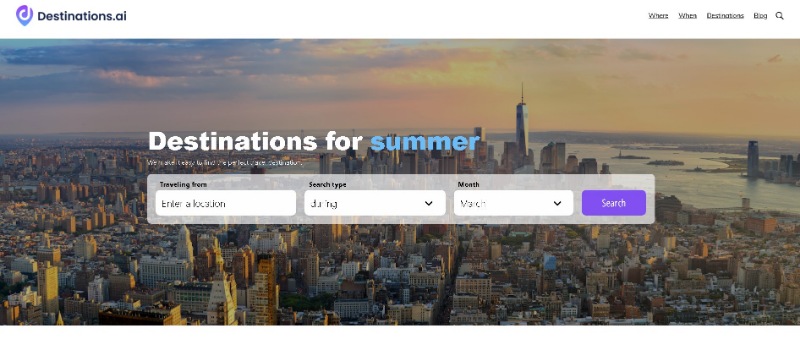
Destinations.ai is made to be your all-in-one artificial travel assistant in a way that traditional travel companies can’t match. Regarding the travel industry, this is the artificial intelligence you want at your disposal. It isn’t just a travel assistant — it is a total vacation planner that uses customer preferences and data analysis to generate an AI-designed holiday trip.
You put in your preferences for travel dates, airlines, budget, temperature, scenery, and other travel planning needs, and Destinations.ai generates a custom-made vacation destination just for you. That includes hotel bookings, flight reservations, and tourist destinations in just a few moments.
Regarding personalized experiences and virtual assistants in the travel industry, there is nothing quite like Destinations.ai. This savvy artificial intelligence points to the future of the travel business, showing the endless possibilities of travel and AI. If you want to explore but aren’t sure where to start, Destinations.ai could be an excellent choice.
- No plan is needed; completely free
- It only takes a few moments to generate an itinerary
- Supplemental travel guides to learn more about a location
- A new tool, so it may have bugs that need to be fixed
- Few reviews yet available to compare
- I can plan trips only in the US at the moment
2. ViaTravelers Authentic AI Travel Planner

As travelers increasingly look for smarter ways to plan their trips, the ViaTravelers Travel Itinerary Generator emerges as a notable tool in AI-driven travel planning. This platform utilizes artificial intelligence to craft personalized itineraries, simplifying the travel planning process for its users. If you are GPT Plus member, they also have a custom GPT called ViaTravelers – Ultimate Travel Planner , so you plan your travel on the go.
The AI at ViaTravelers stands out for its ability to select flights and hotels , among other travel necessities, aligning with a traveler’s preferences and budget. Rather than sifting through myriad options on sites like Kayak or Expedia, this itinerary generator offers a more targeted approach:
- Preferences Tailoring : Users input what’s important for their trip, such as destinations, budget, and themes.
- AI Automation : The AI analyzes preferences against vast data to suggest the most suitable travel plans.
- Personalization : Each itinerary is uniquely generated, tapping into user-specific desires and needs.
ViaTravelers adopts an API similar to that of innovative travel planners, yet it emphasizes authenticity by drawing upon its travel experiences to inform suggestions. This positions the tool as a hybrid between a search engine and a personal travel advisor.
The service also acknowledges the role of AI trip planner tools in streamlining travel planning. By leveraging ChatGPT-like capabilities, it manages to curate personalized travel itineraries seamlessly. Despite these advanced features, ViaTravelers remains impartial, earning commissions on purchases or bookings made through the platform, as is common in the industry. This generator is part of the future of automated travel planning, combining user input with intelligent algorithms for an optimized travel planning experience.
3. Best Tool for Cheap Flight and Hotel Alerts — Mighty Travels
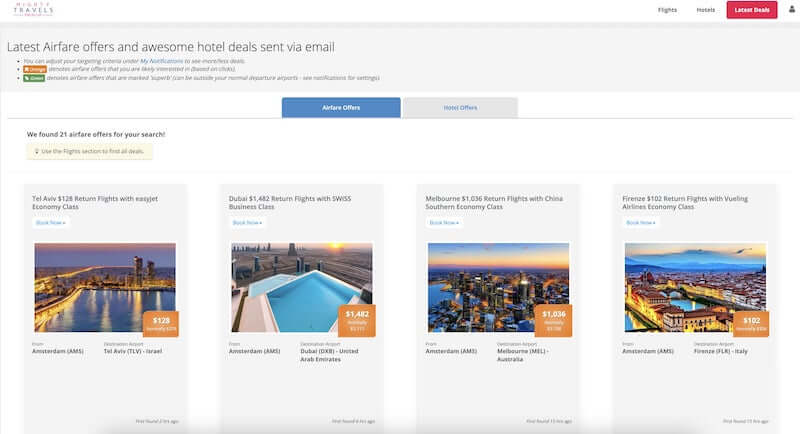
Mighty Travels Premium is a travel platform that provides travelers with a vast array of services designed to enhance the travel experience. It offers an interactive interface providing up-to-date information on flight deals, hotel discounts, and rewards programs.
Mighty Travels Premium can be an invaluable tool for frequent travelers looking to optimize their fare costs and mileage usage. Occasional travelers who prefer a more straightforward booking process may not utilize its full benefits.
- Comprehensive Information: It provides users with extensive flight data, including prices, destinations, airlines, and potential use of miles.
- Updated Deals: Regularly updated fare deals allow users to find the best price for their desired destination.
- Travel Using Miles: The platform indicates how users can leverage various loyalty program miles for their travels.
- Price Comparison: The tool compares the offered and average market prices for each itinerary.
- Global Destination Coverage: Mighty Travels Premium covers a wide range of destinations across the globe, including minor airports and less popular routes.
- Overwhelming Data: For new users or infrequent travelers, the volume of information might be overwhelming and hard to process.
- Premium Feature Accessibility: Some features are only accessible via a premium subscription, which may not be affordable for all users.
- No Direct Booking: You cannot directly book your tickets through the platform. It serves as a search engine redirecting you to third-party websites for actual booking.
- Limited Airline Representation: While it does provide options from various airlines, some low-cost carriers are underrepresented or absent in search results.
4. Best Artificial Intelligence Travel Tool For Groups — KAYAK
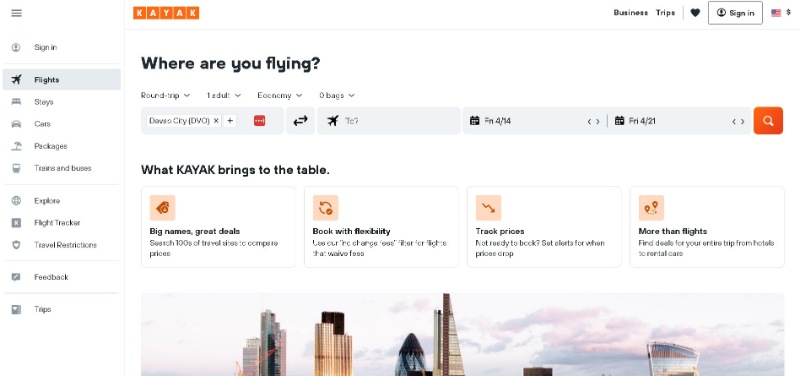
You may have heard of KAYAK as one of the top travel metasearch engines for hotel rooms, flights, and car rentals. However, this AI-driven site in the travel industry can also help curate the perfect itinerary for your next trip, all with the most basic information.
It also tracks the flights during your travel dates to help you find the best deals. Most notably, KAYAK’s itinerary function can be shared between users, making it ideal for planning a vacation with family members or a big group of friends. Customers can also approve flight alerts to get the best deals to book airlines and travel without breaking the bank!
KAYAK may still be primarily known as a standard booking company in the travel and tourism industry, but it has a bright future. If you are planning a group travel experience or want to share your travel plans with friends, this could be right up your alley.
Pros:
- The platform is easy to use and intuitive
- Multiuser sharing makes it easy to plan group trips
- Flight alerts offer the chance to get better deals on travel
- Some reviewers mention information such as travel dates or hotels being changed without their knowledge
- You will need to be cautious of scams, as scammers have found ways to work with KAYAK
See Related: Most Romantic Places in the World
5. Best Artificial Intelligence Travel Tool For Trips With Multiple Stops — Roamr
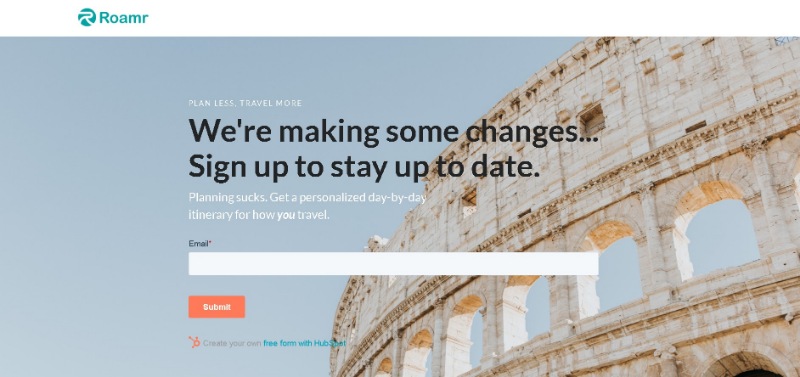
Roamr is a newer artificial intelligence tool that lets you complete a travel itinerary in mere seconds with a few basic details, including your budget, travel dates, and where you want to go.
But the most intriguing feature of Roamr is that it makes it possible to plan a trip between several cities in the same area in a way that most travel companies can’t. One example: want to explore both Munich and Prague in one weekend? Roamr will point you toward local train schedules and other info to help you make multiple stops on a single trip.
This is especially helpful in places such as Europe, where you can quickly jump between cities and even countries within a day. If you have a lot of quick stops on a more extended trip, Roamr could be the travel assistant you need.
- Making an itinerary is super-fast and only requires basic details
- It helps you plan both international and local travel
- Made to work with mobile devices
- Still in its early days, so there may be bugs to smooth out
- Not a lot of reviews online
6. Best Artificial Intelligence Travel Tool For Business Travel — Amgine

Imagine was designed as HelloGbye, an AI-powered platform with business travel in mind. This tool is intended for people who frequently travel in their line of work and have to deal with the regular hassle of booking flights and hotel rooms. What is more, Amgine isn’t purely AI — it works in a unique human-AI interface that helps the booking process and other travel-related methods go more smoothly and successfully.
Business people face unique challenges when booking travel, especially if their job centers on traveling. Imagine is a travel assistant that takes the stress and struggles out of traveling for work, making the process smoother in a way that is beyond human intelligence or the capacities of most tourism companies. If you travel for work regularly — especially if you often cross borders or fly across the world — Amgine could be just what you need when it comes to AI in travel.
- Designed with businesspeople in mind
- It uses a human-AI interface to help the process be smooth and automated but also relevant and helpful
- Not widely available — customers must request a demo on the website to use
7. Best Artificial Intelligence Travel Tool For Those on a Budget — Expedia
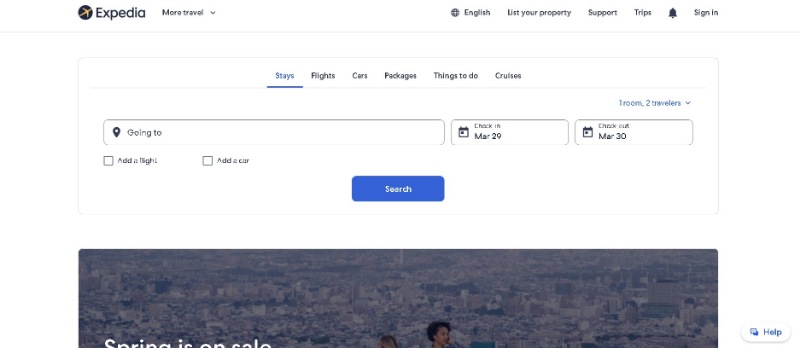
We have all heard of Expedia as a website for booking car rentals, hotel rooms, and other travel needs. However, the popular platform also uses AI to improve its customer experience. Customers start by narrowing their search based on location, budget, travel dates, and other preferences.
Through the artificial intelligence-powered website, Expedia helps you find the cheapest flights and most comfortable hotels with dynamic pricing services. One of the site’s biggest appeals is the helpfulness of the AI chatbot, which can respond promptly to people experiencing travel crises who need to rebook or cancel flights, car rentals, or hotel rooms. If you want to be able to change your travel plans and customize your vacation with a dynamic robot concierge, Expedia could be a perfect choice.
- It helps you find the best accommodation bookings suited to your needs
- The helpful chatbot is widely recognized for its machine-learning algorithms and excellent customer experience
- Travelers can change travel choices as needed, even in an emergency
- Some customers report being able to find better deals by reaching out to hotel owners or travel agents directly
- Cancellation policies may be strict
See Related: Best Spring Break Destinations in the US
8. Best Artificial Intelligence Travel Tool For Those Who Need Offline Access — TripIt
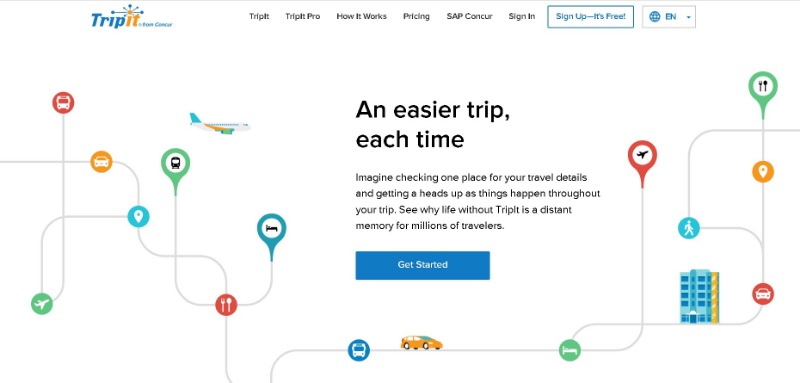
TripIt helps you organize your trip in one place by helping you plan ahead and keeping you abreast of minute-by-minute travel changes. These include everything related to trips, from gate changes to flight delays and other information.
The tools allow users to track their trip even while not connected to the internet, making it a valuable platform for those traveling to places that might not have consistent internet access. The Pro offerings will allow you to track live flight updates, fare adjustments, and other changing information.
- Pro TripIt allows travelers to track live updates regarding their bookings and itinerary.
- An all-in-one platform keeps you organized.
- All you have to do is make a booking and select “forward to TripIt” to have it added automatically to your itinerary
- Offline access to itineraries
- The free version does not offer access to all features, such as live flight updates
9. Best AI Tool For Those Whose Plans Change — iPlan
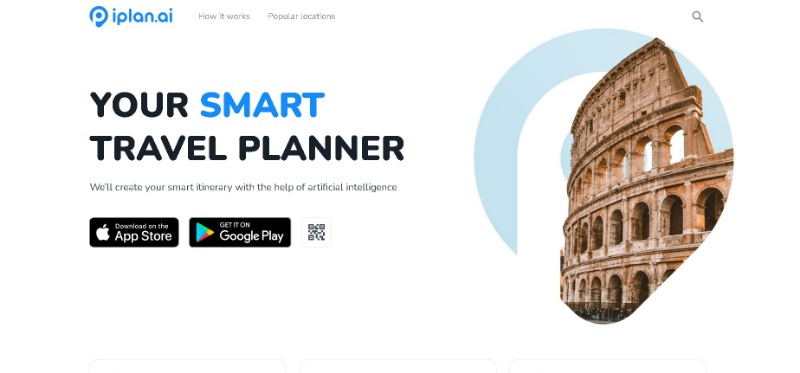
Are you the kind of person who prefers not to have a set-in-stone travel itinerary and instead see where your trip takes you? Many customers are! Users can still use AI in travel with a tool like iPlan . This platform adjusts your itinerary automatically as you update it, customizing it as much as you want.
Through some savvy machine learning, iPlan will rewrite your plans in moments. To make it even easier to coordinate while still being spontaneous, you can share the itinerary with other travelers, making it simple to travel with a group of friends or colleagues.
Every person with access can edit the plans, too. This handy tool proves that planning things doesn’t have to take the fun and spontaneity out of travel.
- Shared edit access makes it easy for group travelers to collaborate
- Problem-solving AI technology adjusts your itinerary as you edit elements
- Quick adjustments help travelers adapt in seconds
- Completely free to users
- Limited information and customer reviews online
10. Best AI Travel Tool For Exploring a City — Roam Around
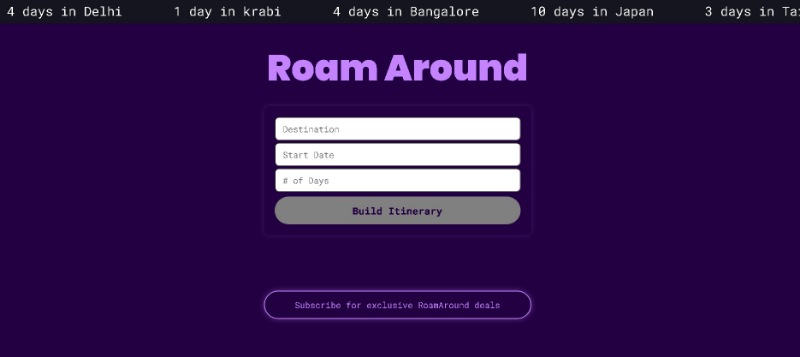
ChatGPT is undoubtedly one of the most well-known AI technologies of today. Roam Around works directly with the platform to assist you with basic travel planning needs.
Performing tasks requires only a small amount of basic information — your destination and the length of your time there. It then produces a tailored itinerary with suggestions for what you should do during your stay.
Roam Around is a pretty essential tool for AI in travel, but this could be helpful for those who don’t know how to formulate sophisticated questions for data processing. On the other hand, some people might find it lacking in terms of tools and filters.
- Offers basic information about tourist destinations to visit during your stay
- Works with ChatGPT, a widely-accessible AI tool
- Basic enough for almost anyone to use it
- It doesn’t allow you to filter or refine your queries
- It might not present enough information for many customers’ needs
- It does not track airlines, flight information, or hotel bookings
See Related: Best Beach Vacations in Europe
11. Best AI Travel Tool For Those Who Want a Unique Experience — Vacay
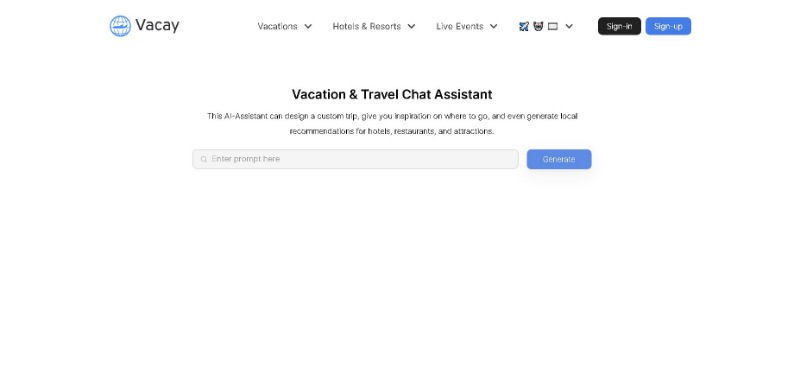
If you’re looking for something genuinely tailor-made for your travel needs and goals, Vacay is a perfect choice. This AI chatbot partners with ChatGPT to help you figure out the ideal vacation for your needs, including destinations, travel dates, things to do, and more.
This is an excellent option for those who want to take a trip but aren’t sure where to start. Vacay will even provide recommendations for local hotels, restaurants, and entertainment. This means that it has many uses, and consequently, you’ll have to know how to use AI chatbots to refine your search.
- Helps design customized vacation itinerary
- Available with suggestions for local hotspots
- Not well-suited for those who don’t know how to write AI prompts
- The itinerary must be copy-pasted to notepad, as details aren’t saved
12. Best AI Travel Tool For Non-English Speakers — Skyscanner
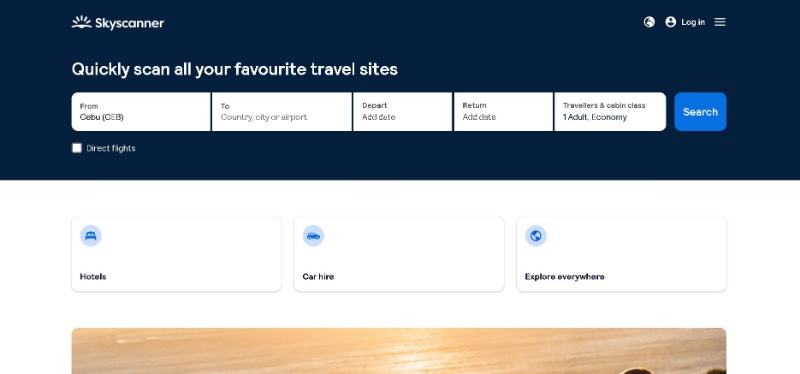
All these travel tools are great, but you might be out of luck if English isn’t your preferred language. If your travel planning happens in another language, you might have an easier time with an AI assistant like Skyscanner . This Edinburgh-based AI tool offers the chance to make an all-in-one travel plan in one of 30 languages.
To make it even more accessible, you can connect to the AI chatbot through social media, including Facebook messenger and WhatsApp . Start by searching with even the barest details — you don’t have to have a destination if you’re unsure where you want to go. To start, you must type “Anywhere,” and you’ll be directed toward the cheapest flights during your travel period.
- Available in 30 languages
- Accessible through social media platforms
- You can get as detailed or barebones as you like
- Not operated on a single platform (you’ll be directed to the website to finish your travel booking)
Related Resources
- Best Destinations in the World
- How to Find the Perfect Travel Destination
- How to Use a Vacation Generator to Find a Destination
Related Posts
- Can You Bring Cigarettes On A Plane? TSA Rules and Restrictions
- Can You Bring Food Into Disney World? What to Know Before Packing Snacks
- Naples vs Florence: Which Italian City Should You Visit?
- The Problems with LAX: Why It’s Considered Bad and How to Improve It
- Do Disposable Cameras Get Ruined in Airport Security? Tips for Travel Photography
- Can You Check a Duffel Bag at the Airport? Know the Rules and Restrictions
THE JOURNAL
Travel Inspiration
Combining the Power of A.I. & Human Connection to Plan the Ultimate Vacation

The Modern Travel Agency
https://www.foratravel.com/the-journal/combining-the-power-of-a-i-and-human-connection-to-plan-the-ultimate
Artificial intelligence (A.I.) has infiltrated the headlines, and the travel industry is no exception.
The New York Times just spotlighted several new and upcoming tools for planning travel, showcasing that “travel-focused A.I. bots (...) and search tools can help you quickly organize your seasonal getaway.”
The New York Times missed a major point.
Sure – chatbots and A.I.-powered apps are helpful starting points for trip planning, but the real killer combo is a travel advisor supercharged with this same technology.
Modern travel advisors pair A.I. and tech tools with hyper-personalized recommendations and VIP experiences. Read on to discover how A.I. and technology are your Fora Advisor’s newest superpowers.
Tech-powered research
If you’ve ever asked a friend for a hotel recommendation, you understand the value of personal intel. Connecting with people who really understand the destination you’re visiting gives you confidence when visiting a new spot and takes the guesswork out of travel bookings.
Fora Advisors work holistically to understand your travel goals, pairing tech-powered research and personal knowledge to deliver your customized itinerary.
Forum, our community app
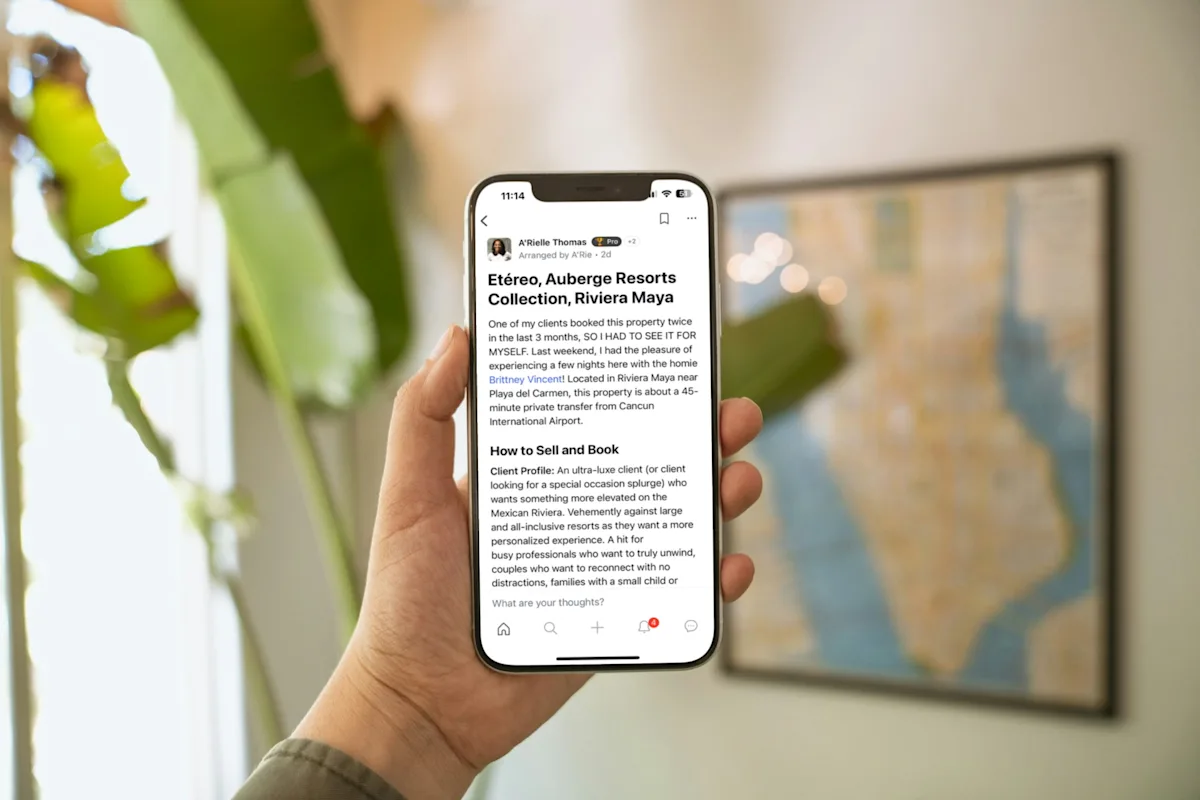
To plan your trip, Fora Advisors have access to Forum , our community app that connects them with our global community of travel insiders at their fingertips. It’s a hive of travel advisor activity, with 1,500+ daily active users averaging 100 new posts and ~18,000 comments as of last month.
A quick skim through recent posts uncovers details from an advisor’s recent tour of The Ritz Paris (with details like the subtle differences between room categories and recommendations on what to order for brunch) and another’s personal stay at Etéreo, Auberge Resorts Collection, Riviera Maya with her tips on the types of clients who would be happiest there.
When a Fora Advisor is booking your trip, they’re using their personal travel intel and they can easily search through the robust database of knowledge – or ask a question themselves and receive a quick answer from the community.
Sidekick, our A.I. tool for advisors

Our first A.I. tool for Fora Advisors is Sidekick, a GPT-4 chatbot and true ‘sidekick’ to our community. Sidekick is trained by our HQ and community data - not generic information available on the Internet - enabling advisors to quickly access the most up-to-date intel about destinations, travel partners and more.
Our advisors interact with Sidekick by asking questions and talking to it. It searches across a wealth of Fora resources (Advisor Portal, Forum, Trainings, Travel Guides, Trip Reports, Partners and our Help Center). Then, it uncovers the most relevant ones to answer questions. In other words, it’s your travel advisor’s bestie for finding insider intel and the most up-to-date information for your trip.
Industry partnerships & seamless booking
A.I. and apps will give you information – a Fora Advisor brings it to life. Fora Advisors tap into our network of long-standing industry partnerships to VIP your trip, plus a sophisticated booking platform – including client reviews, secure credit card information, and rate comparisons to get the best deal for clients and make booking a breeze. Trust us: you’re going to want the best of both worlds to supercharge your vacation.
Industry relationships

We’re proud of our deep-rooted connections in the industry, offering a level of service that transforms a typical vacation into a unique, memorable experience.
When you book a stay through a Fora Advisor, they are communicating directly with the travel partner to make sure you have the best possible travel experience. This can range from getting you the corner suite that you’ve had your eye on to a thoughtful touch like a personal note and amenity in your room upon arrival.
Fora is part of every major preferred partnership program, ranging from Four Seasons Preferred to Rocco Forte Knights . We’ve also launched Fora Reserve, our in-house preferred partner program to help you unlock perks, and sometimes exclusive rates, at boutique and lesser-known properties around the world.
In total, we have access to help you unlock perks like hotel credits and free upgrades at more than 5,500 hotel properties around the world. Some examples of perks include exclusive rates, hotel credits, daily breakfast, upgrades and extended check-in/checkout.
All of our preferred partnership programs are readily available to our Fora Advisors to access through tech by way of our integrated booking platform.
All-in-one booking platform

As a client, when you are ready to book with a Fora Advisor, you share your card details with a secure link via the Vault , our payment storage system. Your advisor squares away all of the details you’ve discussed for your trip, and you get a confirmation in your inbox. It’s as easy as saying “charge it to my work card” to get your full trip booked and confirmed.
Behind the scenes, your Fora Advisor is booking with our all-in-one booking platform . It’s a one-stop tech platform for everything they need to research, quote and book. They have access to details like Fora Perks at each property, how many times it’s been booked by fellow Fora Advisors, easy-to-access price and rate comparisons, and trusted reviews from Fora travelers around the world. Our tech allows Fora Advisors to seamlessly narrow down the best option for your stay, as well as quote and book your trip from their office or while on the go with their mobile device.
In the end, it’s not A.I. versus humans. It’s both. Technology-enabled, modern travel advisors who know how to utilize the best of both worlds.
Ready to travel? Connect with Fora to plan and book your dream getaway today.
Book with Fora
Tell us more about yourself to get matched with a Fora Advisor and start planning your dream trip today.
- Travel, Tourism & Hospitality ›
- Leisure Travel
Industry-specific and extensively researched technical data (partially from exclusive partnerships). A paid subscription is required for full access.
Main technology solutions planned to be implemented by travel agencies worldwide 2023
A 2023 global survey examined the main technology solutions planned to be implemented by leisure travel agencies over the next 12 months. New distribution capabilities (NDC) ranked as the main tech solution to be adopted in the coming year, as indicated by 40 percent of responents.
Main technology solutions planned to be implemented by leisure travel agencies worldwide in the next 12 months as of 4th quarter 2023
- Immediate access to 1m+ statistics
- Incl. source references
- Download as PNG, PDF, XLS, PPT
Additional Information
Show sources information Show publisher information Use Ask Statista Research Service
150 respondents
senior leaders of leisure travel agencies that are involved in technology investment; figures refer to travel agencies that deal directly with the public and exclude online travel agencies (OTAs) and business travel agencies (BTAs)
The countries involved in the study included Brazil, China, France, Germany, India, Mexico, South Korea, the United Arab Emirates, the United Kingdom, and the United States.
Other statistics on the topic
- Global artificial intelligence market size 2021-2030
- AI corporate investment worldwide 2015-2022
- AI startup company funding worldwide 2020-2023, by quarter
- Funding of chatbot/conversational AI startups worldwide 2023
To download this statistic in XLS format you need a Statista Account
To download this statistic in PNG format you need a Statista Account
To download this statistic in PDF format you need a Statista Account
To download this statistic in PPT format you need a Statista Account
As a Premium user you get access to the detailed source references and background information about this statistic.
As a Premium user you get access to background information and details about the release of this statistic.
As soon as this statistic is updated, you will immediately be notified via e-mail.
… to incorporate the statistic into your presentation at any time.
You need at least a Starter Account to use this feature.
- Immediate access to statistics, forecasts & reports
- Usage and publication rights
- Download in various formats
You only have access to basic statistics. This statistic is not included in your account.
- Instant access to 1m statistics
- Download in XLS, PDF & PNG format
- Detailed references
Business Solutions including all features.
Statistics on " Generative artificial intelligence (AI) "
- Global generative AI market size from 2020 to 2030
- Growth of the generative AI market globally from 2021-2030
- AI tool user numbers worldwide from 2020-2030
- Market share of leading generative AI text tools worldwide in 2023
- Market share of leading generative AI image tools worldwide in 2023
- Benchmark comparison between Google's Gemini and OpenAI's GPT-4 in 2024
- Reasoning benchmark comparison between Gemini Ultra and GPT-4 2024
- Math benchmark comparison between Gemini Ultra and GPT-4 in 2024
- Code benchmark comparison between Gemini Ultra and GPT-4 in 2024
- Comparison in capability with MMLU benchmark for major generative AI programs 2023
- Comparison in capability with HumanEval benchmark for generative AI programs 2023
- Comparison in capability with GSM8K benchmark for major generative AI programs 2023
- Total funding of LLM developers worldwide in 2023
- Funding of Machine Learning Operations/Platform startups worldwide 2024
- Number of generative AI solutions on Google Cloud marketplace 2024, by type
- Share of generative AI use at work or outside work worldwide in 2023, by region
- Share of generative AI use at work or outside work worldwide in 2023, by industry
- Weekly usage of AI tools in 2023, by age range
- Generative AI market size in the United States from 2020-2030
- Generative AI market growth United States 2020-2030
- Opinions and concerns of AI per respondents in the United States 2023
- Concerns of AI tools replacing jobs per respondents in the United States 2023
- Comfort with AI for use in daily tasks per respondents in the United States 2023
Other statistics that may interest you Generative artificial intelligence (AI)
- Basic Statistic Global artificial intelligence market size 2021-2030
- Premium Statistic Global generative AI market size from 2020 to 2030
- Premium Statistic Growth of the generative AI market globally from 2021-2030
- Premium Statistic AI corporate investment worldwide 2015-2022
Generative AI tools
- Premium Statistic AI tool user numbers worldwide from 2020-2030
- Premium Statistic Market share of leading generative AI text tools worldwide in 2023
- Premium Statistic Market share of leading generative AI image tools worldwide in 2023
Generative AI benchmarks
- Premium Statistic Benchmark comparison between Google's Gemini and OpenAI's GPT-4 in 2024
- Premium Statistic Reasoning benchmark comparison between Gemini Ultra and GPT-4 2024
- Premium Statistic Math benchmark comparison between Gemini Ultra and GPT-4 in 2024
- Premium Statistic Code benchmark comparison between Gemini Ultra and GPT-4 in 2024
- Premium Statistic Comparison in capability with MMLU benchmark for major generative AI programs 2023
- Premium Statistic Comparison in capability with HumanEval benchmark for generative AI programs 2023
- Premium Statistic Comparison in capability with GSM8K benchmark for major generative AI programs 2023
Generative AI developers
- Premium Statistic AI startup company funding worldwide 2020-2023, by quarter
- Premium Statistic Total funding of LLM developers worldwide in 2023
- Basic Statistic Funding of chatbot/conversational AI startups worldwide 2023
- Premium Statistic Funding of Machine Learning Operations/Platform startups worldwide 2024
- Premium Statistic Number of generative AI solutions on Google Cloud marketplace 2024, by type
Generative AI use
- Premium Statistic Share of generative AI use at work or outside work worldwide in 2023, by region
- Premium Statistic Share of generative AI use at work or outside work worldwide in 2023, by industry
- Premium Statistic Weekly usage of AI tools in 2023, by age range
Special focus: United States
- Premium Statistic Generative AI market size in the United States from 2020-2030
- Premium Statistic Generative AI market growth United States 2020-2030
- Premium Statistic Opinions and concerns of AI per respondents in the United States 2023
- Premium Statistic Concerns of AI tools replacing jobs per respondents in the United States 2023
- Premium Statistic Comfort with AI for use in daily tasks per respondents in the United States 2023
Further Content: You might find this interesting as well
Along with Stanford news and stories, show me:
- Student information
- Faculty/Staff information
We want to provide announcements, events, leadership messages and resources that are relevant to you. Your selection is stored in a browser cookie which you can remove at any time using “Clear all personalization” below.
Despite a proliferation of spy-themed entertainment, many Americans, including some of the country’s top policymakers, know little about the U.S intelligence community and often get much of it wrong, says Stanford scholar Amy Zegart .
Go to the web site to view the video.
Stanford scholar Amy Zegart discusses how emerging technologies have had profound changes on U.S. intelligence.
In a new book, Zegart examines what is at risk when intelligence is grossly misunderstood. “Spy-themed entertainment has become adult education and appears to be influencing how Americans think about hot-button intelligence issues,” said Zegart, a senior scholar at the Freeman Spogli Institute for International Studies (FSI) and the Morris Arnold and Nona Jean Cox Senior Fellow at the Hoover Institution.
In Spies, Lies, and Algorithms: The History and Future of American Intelligence (Princeton University Press, 2022), Zegart also traces how American espionage has evolved over the centuries and what’s at stake in its future as technology rapidly changes and transforms all aspects of government and society.
More intelligence about intelligence
For nearly three decades, Zegart has studied the secret world of U.S. intelligence and Americans’ attitudes toward it, including the influence fictional spies have had on everyone from students in her classroom to the upper echelons of government.
Fictional movies and TV shows about U.S. intelligence – known also as “spytainment” – are giving Americans an unrealistic impression about the U.S. intelligence community and the issues they portray, Zegart said. For example, the “do whatever it takes” interrogation methods used by 24 ’s Jack Bauer – such as waterboarding, a technique that simulates drowning and is considered by many to be a form of torture – don’t work as the show depicts they do. The ticking time bomb scenario that frequently drove the show’s storylines is also not how terror plots unfold, and intelligence officers – like Homeland ’s Carrie Mathison – don’t run rogue, without oversight.

Amy Zegart’s new book, Spies, Lies, and Algorithms: The History and Future of American Intelligence , examines the past, present and future of U.S. intelligence. (Image credit: Princeton University Press)
The idea for Spies, Lies, and Algorithms originated when Zegart was teaching the course U.S. Intelligence Agencies in Theory and Practic e at UCLA, where she taught before joining the Stanford faculty in 2012.
It was 2009, and public trust in the U.S government had declined to historically low levels . At the time, the U.S. intelligence community was embroiled in controversy. The Iraq War, which Zegart points out in the book “began with faulty intelligence,” was in its sixth year. There were ongoing debates about the National Security Agency’s expansion of its warrantless wiretapping program in the wake of the Sept. 11 attacks, and the Senate Intelligence Committee was getting ready to investigate the CIA’s detention and interrogation of suspected terrorists in secret prisons across the world.
When Zegart showed up to teach on the first day of her class, she expected protestors outside her classroom and empty seats inside. Instead, it was standing room only, with students eager to learn more about U.S. intelligence, Zegart recalled.
Many had questions about controversial issues they were reading in the news and watching on TV and movies: They wanted to know more about the Iraq WMD intelligence failure, whether CIA black sites violated the law, if the National Security Agency was eavesdropping on their phone calls.
Zegart, in turn, was also curious. She wanted to learn more about her students’ attitudes toward these issues. She surveyed her students and was troubled by some of the patterns that emerged in the data, particularly what appeared to be a connection between television viewing habits and attitudes toward torture. Zegart found that those who watched the TV show 24 – which frequently depicted the use of violence and torture to extract information from terror suspects – were statistically more likely to approve of waterboarding and justify other extreme forms of counterterrorism methods, like rendition, than those who didn’t tune in to spy-themed dramas.
These findings were replicated when Zegart conducted two national surveys in 2012 and 2013 with the polling firm YouGov.
Across all surveys, Zegart saw just how little Americans knew about what the National Security Agency and other agencies in the intelligence community did, despite the deluge of news at the time surrounding the massive leak of classified information from the NSA by the organization’s former employee and contractor, Edward Snowden in 2013.
Over the following years, Zegart has seen a similar lack of understanding among policymakers about how intelligence agencies operate. For example, in 2009 during the confirmation hearings for Leon Panetta to become the next director of the CIA, Zegart noticed members of the Senate Intelligence Committee using 24 plotlines in the questions they posed to the nominee.
And it’s not just students and policymakers who appear to be influenced by spytainment, but military trainees as well. Zegart shares in her book how the dean of the U.S. Military Academy at West Point, Army Brig. Gen. Patrick Finnegan, was so concerned about how 24’s depiction of torture was affecting his cadets that he met with the show’s creative team in Los Angeles to ask them to stop producing episodes that portrayed such brutal techniques as being effective. And in what Zegart describes as “a truth-is-stranger-than-fiction moment,” when Finnegan showed up to the meeting in his uniform, the crew presumed he was an actor .
Understanding intelligence in a digital age
Zegart’s book also explores how spycraft is evolving. In a digital world, furthering a better understanding of U.S. intelligence is more important than ever before, because technology is transforming who gathers intelligence and how.
Intelligence is no longer shrouded in classified files at Langley; it’s found online in public spaces like Google Earth, where anyone can uncover government secrets hidden in plain sight. For example, thanks to the thousands of satellite images readily available, Stanford scholars – not special agents with security clearances – were able to sleuth out nuclear programs in Iran and North Korea .
“Today, anybody with a cellphone and an internet connection can collect or analyze intelligence,” Zegart said. When Russia invaded Ukraine in 2014, the most important intelligence about the annexation didn’t come from classified information, it came from selfies that Russian soldiers posted on social media with Ukrainian highway signs in the background, she pointed out.
“What that means is that superpower governments no longer control the collection and analysis of intelligence like they used to in the Cold War. It’s a totally different enterprise today,” Zegart said.
Meanwhile, technological changes have also led to more people in the American public needing intelligence.
For example, threats to critical infrastructure – like the cyberattack on the Colonial Pipeline in 2021 – mean sectors from the financial services industry to public utility companies need intelligence about threats to their systems. And interference by foreign adversaries on elections means more voters need information about how to safeguard elections, said Zegart.
Simultaneously, intelligence agencies themselves have also had to balance the advantages and disadvantages that new technologies, like artificial intelligence, quantum computing and social media, offer in gathering intelligence around the world.
“These tools have incredible potential, but they also have real limits and real risks,” Zegart said. For example, when it comes to detecting nuclear threats from a foreign threat, relying on artificial intelligence to inform analysis is not enough. “Imagine going to the president and saying, ‘Mr. President, we think that China is likely to invade Taiwan, because that’s what the AI tells us.’ It’s not so compelling, right? Analysis isn’t just about data. It’s also an act of persuasion,” Zegart added.
All these changes call for a new mindset about how the intelligence community thinks about classified information, said Zegart.
“We need to fundamentally reimagine what intelligence can do and should do in a digital era, and that starts by realizing that secrets don’t play the role they used to,” Zegart said.
Making intelligence more transparent is a huge shift for intelligence agencies, and while the CIA has made some progress on being more transparent with the public about what it does, it still feels counterintuitive.
“It’s an unnatural act for secret agencies to be public, but it’s really important for the American people to understand what they do,” Zegart said.
Media Contacts
Melissa De Witte, Stanford News Service: [email protected]

An official website of the United States government
Here's how you know
Official websites use .gov A .gov website belongs to an official government organization in the United States.
Secure .gov websites use HTTPS A lock ( Lock Locked padlock ) or https:// means you've safely connected to the .gov website. Share sensitive information only on official, secure websites.
- Office of the Director of National Intelligence
- Defense Intelligence Agency
- Department of Homeland Security, Office of Intelligence and Analysis
- National Reconnaissance Office
- National Security Agency
- National Geospatial-Intelligence Agency
- Coast Guard Intelligence
- United States Space Force
- Department of the Army
- Department of the Air Force
- Federal Bureau of Investigation

Students And Internships

Virtual Student Federal Service (VSFS)
The VSFS is the world's longest-running remote internship program run by the U.S. Department of State. You will develop apps, design graphics, manage social media, conduct research and more. You will work 10 hours per week from September through May in unpaid internship positions. We had 104 interns work on 15 projects in the 2020–21 academic year.
Presidential Management Fellows (PMF) program
The federal government's flagship leadership development program hires fellows from diverse academic disciplines for a two-year fellowship, ultimately leading to a job within the agency. You must meet specific requirements and have or are in the process of completing your advanced degree . Apply online through a rigorous assessment that covers various competencies. If you qualify and are selected, you start at a GS 9 level, but agencies can appoint you at a higher level. Agencies will post PMF opportunities throughout the year to USAJOBS.gov .
Office of General Counsel (OGC) internship
The OGC provides legal advice and counsel to the Director of National Intelligence (DNI) and other ODNI officials on a wide range of legal issues including:
- Intelligence and national security law
- Procurement and acquisition law
- Personnel law
- Government ethics
- Budget and fiscal law
- General administrative law
- Legislative support
- Government information practices (Freedom of Information Act/Privacy Act)
- Intellectual property law
We seek highly qualified law students for our internship program. You must be a U.S. citizen who—at the time of the application—holds a TS/SCI security clearance based on a Single Scope Background Investigation (SSBI) that was completed within the past five years. We prefer applicants who have successfully passed at least a counterintelligence polygraph.
Find your ODNI career now

Language selection
- Français fr
Canada joins international security partners in release of advisory, guidance on growing cyber security threat to civil society
From: Communications Security Establishment Canada
News release
The Canadian Centre for Cyber Security, a part of the Communications Security Establishment Canada, joins several global security partners today in warning the public about a growing cyber security threat to civil society organizations and individuals, a community that has been deemed high risk for state-sponsored cyber threats.
Ottawa, Ontario – May 14, 2024 The Canadian Centre for Cyber Security, a part of the Communications Security Establishment Canada, joins several global security partners today in warning the public about a growing cyber security threat to civil society organizations and individuals, a community that has been deemed high risk for state-sponsored cyber threats.
In a new advisory co-authored by Canada, the United States, Estonia, Japan, Finland and the United Kingdom, cyber security agencies share new details about the ways and means foreign threat actors use for cyber attacks on civil society targets. The high-risk community of civil society organizations and individuals is defined in the report as: nonprofit, advocacy, cultural, faith-based, academic, think tanks, journalist, dissident, and diaspora organizations, communities, and individuals involved in defending human rights and advancing democracy.
According to industry reporting shared in the advisory, state-sponsored targeting of these organizations and individuals comes predominantly from the governments of Russia, China, Iran, and North Korea. Those same industry reports highlight the growing and real cyber security threat to civil society, which they describe as high-risk because:
- Civil society organizations and their staff have a high threat of being targeted by malicious cyber attacks – and are known targets -- of state-sponsored cyber actors seeking to undermine democratic values; and
- Civil society organizations have a low capacity to defend themselves from such threats, often due to resourcing and the public nature of their work.
The advisory warns that the tactics are growing more and more personalized and subversive, with threat actors known to invest significant time and resources to researching each target. The report includes examples of how threat actors may pose as trustworthy sources to trick a victim into interacting with a malicious hyperlink. In another memorable example shared, the threat actors set up trojan-style, fake apps and online app stores housing malicious software – allowing them to access targets’ personal accounts and devices – and even remotely take over a user’s device.
The advisory includes prevention tips and resources for civil society organizations, individuals, and software manufacturers.
Canadians can stay informed by visiting getcybersafe.gc.ca or cyber.gc.ca for more on how to stay cyber secure.
“The expression of civil rights and free speech is a cornerstone of Canadian democracy. Unfortunately, authoritarian governments are increasingly using cyber means to target civil society groups and individuals, often across international borders. CSE, in close collaboration with global partners, is working hard to defend and protect our democratic institutions from such threats.” - Caroline Xavier, Chief, Communications Security Establishment Canada
“The Canadian Centre for Cyber Security, a part of CSE, welcomes this report. The best way to protect Canadians from the growing threat of foreign interference, and digital transnational repression is to raise awareness about the threat. We all have a role to play in defending Canada from threats to our democratic institutions, including our civil society organizations and individuals.” - Sami Khoury, Head, Canadian Centre for Cyber Security
Quick facts
According to Microsoft, in 2023, NGOs and think tanks were the second most targeted by state-sponsored actors (following the Information Technology Sector ).
As of November 2023, CrowdStrike reporting revealed that five state-sponsored groups are known to target think tanks, eleven groups represent potential threats to NGOs, two groups target dissidents, and one group is known to target nonprofit organizations (NPOs).
Cloudflare has observed that malicious cyber activity against civil society organizations is “generally increasing.” In Quarter 2 of 2023, NPOs were targeted more than any other industry when looking at malicious traffic to NPO websites as a proportion of total traffic. In Quarter 3 of 2023, NPO and independent media organizations placed second behind the metals and mining industry, with 17.14% of all traffic to NPOs representing distributed denial-of-service (DDoS) attacks. Similarly, the European Union Agency for Cybersecurity (ENISA) found that targeted individuals within civil society were the second most-targeted sector globally between July 2022 and June 2023.
From 2022 to 2023, CSE produced over 3,000 foreign intelligence reports to alert and inform the Government of Canada about foreign-based threats and global events affecting Canada.
CSE helps to protect Canada’s democratic process by:
- providing foreign signals intelligence to Government of Canada decision makers about the intentions, capabilities, and activities of foreign-based threat actors
- defending Canada’s federal elections infrastructure from malicious cyber activity
- proactively helping democratic institutions improve their cyber security
- sharing unclassified threat assessments with the public
- sharing information to help Canadians identify disinformation.
CSE’s Cyber Centre has been posting advice and guidance online to help inform and educate Canadians on the cyber threats that may be directed against Canada:
- 7 signs of phishing
- What is phishing?
- Signs of a phishing campaign: How to keep yourself safe
- Phishing: an introduction
- Protect your organization from malware
Associated links
- Mitigating Cyber Threats with Limited Resources: Guidance for Civil Society
- CISA, FBI and International Partners Publish Guide for Protecting High-Risk Communities
- Joint Statement on the Strategic Dialogue on Cybersecurity of Civil Society Under Threat of Transnational Repression
- Communications Security Establishment releases 2023 update on cyber threats to Canada’s democratic process
- Online disinformation
- Protecting democracy
Stay Connected Follow CSE on Twitter
For more information (media only) please contact: CSE Media Relations [email protected]
Page details

IMAGES
VIDEO
COMMENTS
Quick Deals. EddyTravels is an AI-based flight and hotel booking app with an interactive AI assistant called Eddy AI. In a few clicks, you can get custom-tailored flight, hotel, and tour recommendations based on your needs. After getting some initial recommendations, you can change your dates or ask for more info.
Advances in artificial intelligence (AI), including generative AI (gen AI), and machine learning (ML) are equipping the industry to reimagine what it means to plan, book, and experience travel. This surge of innovation sets the stage for travel companies to rethink how they interact with customers, develop products and services, and manage ...
On this episode of The McKinsey Podcast, McKinsey partners Alex Cosmas and Vik Krishnan join global editorial director Lucia Rahilly to discuss a new report on travel in the age of AI: what the technology's promise and pitfalls are and what it may mean for the travel industry overall. This transcript has been edited for clarity and length.
AI for travel comes in many forms. For example, it can respond to customer questions and queries with chatbots and digital assistants; offer personalized travel recommendations based on someone's previous search history; analyze customer reviews and social media posts; and track bags, flight forecasts and other variables.. As a result, organizations can pinpoint inefficiencies, learn from ...
People are wanting that personal touch.". Richter thinks that AI will help automate simple bookings, like a trip home or business travel. "To that end, I think that it might make it faster and ...
Artificial intelligence won't be replacing human travel advisors anytime soon, but experts say agencies that excel will be the ones that effectively incorporate machine learning into their operations.
DIY travel booking gets a helping hand from new services — some of them based on artificial intelligence — that help refine your choice of destinations, hotels and flights.
Jan. 18, 2024, 5:01 a.m. ET. It is hard to believe that it has only been about a year since travelers started dabbling in ChatGPT-created itineraries. This year will bring even more ...
Travel agents can also help when plans change and they are faster and better at helping make dynamic successful changes to ensure the happiness and the overall experience of a trip, or even help you to deal with a crisis situation. By letting artificial intelligence take on minor questions and minor day-to-day operations, human travel agents ...
The rapidly advancing field of artificial intelligence (AI) is revolutionizing various industries, and the tourism industry is no exception. Whether it's improving travel planning, enhancing customer service, optimizing marketing strategies, or addressing ethical concerns, AI is reshaping the way we experience and engage with the tourism sector. ...
Artificial Intelligence can be utilized in many different ways. getty. FCTG, one of the world's largest travel management companies, has announced the establishment of an 'AI Center of ...
Travel-focused A.I. bots and more eco-friendly transportation options in online maps and search tools can help you quickly organize your seasonal getaway. By J. D. Biersdorfer J.D. Biersdorfer has ...
The race to embrace AI in travel is on. Our survey of travel executives—part of an extensive cross-industry analysis of over 1,600 C-suite executives and data science leaders from the world's largest organizations—reveals that most travel organizations are barely scratching the surface in AI.. Just 13% of travel companies have the AI maturity today to unlock its full potential.
How Artificial Intelligence (AI) is Changing the Travel Industry. The benefits of Artificial intelligence (AI) within the travel industry, and how it is changing the way travel companies operate.
Apr 10, 2023. Technology Travel Agents Travel Trends. Generative artificial intelligence — such as the tool that created most of this image — uses prompts to scan existing content and produce something completely new, such as audio, imagery and text. Credit: 2023 Midjourney/Composite by Deborah Dimond. One day, artificial intelligence (AI ...
According to a report by Statista, AI is estimated to bring in $14.3 billion of revenue to the global travel and tourism industry by 2022. This growth is expected to continue as AI technology continues to improve and become more widely adopted. Furthermore, a study by the World Travel & Tourism Council suggests that AI and Machine Learning ...
Instead, it was AI in the driving seat. It's called Mindtrip and it has just raised $7 million in seed funding from Costanoa Ventures to help carve out its own chunk of the 10% of the economy ...
Our Agency. We give U.S. leaders the intelligence they need to keep our country safe. As the world's premier foreign intelligence agency, the work we do at CIA is vital to U.S. national security. We collect and analyze foreign intelligence and conduct covert action. U.S. policymakers, including the President of the United States, make policy ...
Amadeus artificial intelligence. We are focused on ways to use artificial intelligence (AI) in the travel industry to better serve our customers, so they can better serve their customers, the end travelers. We see AI as a key enabler in making the overall travel experience smoother while helping travel players improve their businesses.
1:21. It wasn't so long ago that travelers planned trips without the internet. "Back in the day, our parents used to go to these travel agents and really kind of express what they were looking ...
Thanks to AI, travelers no longer need to visit travel agencies to book flights or search for accommodation. AI assistants and Intelligent chatbots have now taken the place of travel agents allowing travelers to book flights and accommodations and hire vehicles online. ... Mindtree's PaxPulse is a social Intelligence and Recommendation ...
MMGY Global is the world's leading integrated marketing company specializing in the travel, tourism and hospitality industry representing multiple agency brands with one goal: to inspire people to go places. Our communications practice is composed of multiple best-in-class brands including Travel Intelligence, TCI Research, Grifco, Hills ...
Better Customer Experience. Artificial intelligence is revolutionizing the travel industry. Travel and Tourism agencies are investing in AI to deliver an improved experience to travelers. Compared to offline services (i.e., human-based), AI Chatbot integration in travel apps makes services available 24*7 and responds to customers instantly.
5. Best Artificial Intelligence Travel Tool For Trips With Multiple Stops — Roamr. Roamr / Roamr. Roamr is a newer artificial intelligence tool that lets you complete a travel itinerary in mere seconds with a few basic details, including your budget, travel dates, and where you want to go. But the most intriguing feature of Roamr is that it ...
The Modern Travel Agency. Fora. Artificial intelligence (A.I.) has infiltrated the headlines, and the travel industry is no exception. The New York Times just spotlighted several new and upcoming tools for planning travel, showcasing that "travel-focused A.I. bots (...) and search tools can help you quickly organize your seasonal getaway.".
THE DIA MUSEUM. DIA provides intelligence on foreign militaries and their operating environments so the United States and its allies can prevent and decisively win wars. We serve everyone from the president to the soldier in combat through a combination of expert analysis, intelligence gathering, and cutting-edge science and technology.
Published by Statista Research Department , May 10, 2024. A 2023 global survey examined the main technology solutions planned to be implemented by leisure travel agencies over the next 12 months ...
Simultaneously, intelligence agencies themselves have also had to balance the advantages and disadvantages that new technologies, like artificial intelligence, quantum computing and social media ...
The VSFS is the world's longest-running remote internship program run by the U.S. Department of State. You will develop apps, design graphics, manage social media, conduct research and more. You will work 10 hours per week from September through May in unpaid internship positions. We had 104 interns work on 15 projects in the 2020-21 academic ...
The Canadian Centre for Cyber Security, a part of the Communications Security Establishment Canada, joins several global security partners today in warning the public about a growing cyber security threat to civil society organizations and individuals, a community that has been deemed high risk for state-sponsored cyber threats.